
HK$55 / H1 2023 January-June 2023 HONG KONG
smart HR
blueprint for workforce strategy This edition celebrates empowering the workforce, equity, and big dreams EMPOWERMENT
The
professional’s
SPECIAL THE 2023

Themed “The Great Talent Reformation”, more than 150 attendees gathered to reimagine their talent strategies, as well as to enjoy the learning and networking opportunities among their peers.
On her recent visit to Hong Kong, Jeanne Bauer-Hamlett, Executive Director, Human Resources – Solutions & Services Group (SSG) – Lenovo, took Tracy Chan through the company’s culture transformation journey.


Meet the winners of the Employee Experience Awards 2023, Hong Kong.


DIANA AVILA, Global Head of Banking and Expansion at Wise, shares her experience, vision, and advice for women looking to develop their careers in the fintech industry.

H1 2023 « Human Resources Online Hong Kong « 1 FEATURE CONTENTS Jan-Jun 2023 FEATURE GLOBAL PERSPECTIVES BREAKING BARRIERS Regulars 2 – Editor’s Note 4 – Suite Talk 6 – Snapshot 8 – Whitepaper 10 – HR by Numbers 36 – Legal Updates 40 – Last Word EVENTS SNIPPETS FROM TALENT MANAGEMENT ASIA, HONG KONG EVENTS 26 WOMEN POWER HRO hears from 13 female leaders from North Asia to understand how to find the balance in embracing both equity and equality in the workplace, and even in their personal lives. 18 12 To subscribe call: +852 2861 1882 / +65 6423 0329 or email: subscriptions@humanresourcesonline.net publisher & managing director Evelyn Wong editor-in-chief Aditi Sharma Kalra senior journalist Tracy Chan english sub-editor James Foster graphic design Julia Li advertising sales Karen Yung Sally Hui delegate sales Gloria Yam Mandy Chan circulation Deborah Quek marketing Cyrus Ching event production Selina Kwok Lemuel Cheung Gokce Narin event services Hedy Chao office manager Irene Wong Human Resources is published half-yearly by Lighthouse Independent Media Ltd. Printed in Hong Kong by Apex Print Ltd. Subscription rates are available on request, contact the Circulation Manager by telephone: +852 2861 1882 / +65 6423 0329 or by email to: subscriptions@humanresourcesonline.net COPYRIGHTS AND REPRINTS. All material printed in Human Resources is protected under the copyright act. All rights reserved. No material may be reproduced in part or in whole without the prior written consent of the publisher and the copyright holder. Permission may be requested through the Hong Kong office. DISCLAIMER: The views and opinions expressed in Human Resources Online are not necessarily the views of the publisher. Hong Kong: Lighthouse Independent Media Ltd 15/F, Golden Star Building, 20-24 Lockhart Road, Wanchai, Hong Kong Tel: +852 2861 1882 Fax: +852 2861 1336 Singapore: Lighthouse Independent Media Pte Ltd 100C Pasir Panjang Road, #05-01, See Hoy Chan Hub, 118519 Tel: +65 6423 0329 Fax: +65 6423 0117 22
32
EMPOWERING THE WORKFORCE, EQUITY, AND BIG DREAMS
Dear readers,
Every magazine we curate for you means so much to us – but this one, I admit, is extra special. This edition celebrates all the reasons that elevate work into something more meaningful – an imperative to progress, a reason to change, and a cause to celebrate the big wins as much as the small milestones that brighten up the journey. This edition celebrates empowerment.
The cover story (on page 12) features powerful champions of both equity and diversity. A total of 13 business leaders have spoken to the HRO team on how they are embracing equality and equity in the workplace, improving equity for women in their sector, and how embracing equity has impacted their lives.
“Women have long dealt with an invisible culture of exclusion. Equity is the next step; recognising equality alone is not enough: it is no longer sufficient to treat everybody the same, and organisations need to provide tailored support to help everyone be successful,” affirms Clare Lin, Senior Director, HRBP APAC, Yahoo, to HRO.
At Telstra, for example, equal opportunity is promoted for all backgrounds – be it age, beliefs, ethnicities or gender orientations.
Alice Ting, Managing Director of Hong Kong, Telstra shares: “We make diversity part of our everyday conversations to set an example and lead the telecoms industry towards an equity-based and inclusive community.”
I won’t give everything away – please head to page 12 to read all their insights.
While putting this edition together, HRO’s Tracy Chan also had the opportunity to meet Jeanne Bauer-Hamlett, Executive Director, Human Resources – Solutions & Services Group (SSG), Lenovo, during her recent visit to Hong Kong.
Tasked with providing strategic HR leadership to Lenovo’s SSG unit, Bauer-Hamlett firmly believes an effective HR partner has to really understand the business, not only its strategy, but what it is today and what it will be tomorrow.
“As I always tell Ken Wong, President of SSG, my job is to be three steps ahead of him, and I do get close,” she quips.
Over the past few years, Lenovo has been open about wanting a diverse workforce. While everyone has to align with the same cultural values, it also recognises that the different perspectives, views, and experiences brought in by employees can make the company stronger, and this is also important on the product side to reflect the diversity among its customers.

As such, all leaders have worked hard towards establishing mechanisms that empower the diverse workforce’s big dreams. From employee resource groups to the ‘Lenovo Listens’ initiative, read all about it in our exclusive interview on page 22.
In the pages ahead, you will also enjoy key takeaways from our annual flagship conference, Talent Management Asia (page 18) as well as stories from the winners and finalists of HRO’s Employee Experience Awards – Hong Kong, putting their best practices and winning initiatives in the spotlight.
As always, we thank you for taking the time to read the magazine and for sharing your feedback! We hope the second half of the year brings you success as well as good health as you start to prepare your strategies for the following year. Enjoy the read.
Aditi Sharma Kalra Editor-in-Chief


» Human Resources Online Hong Kong » H1 2023 2 EDITOR’S NOTE
SUCCESS BREEDS SUCCESS: PEOPLE ALWAYS COME FIRST IN JEBSEN GROUP’S HR JOURNEY
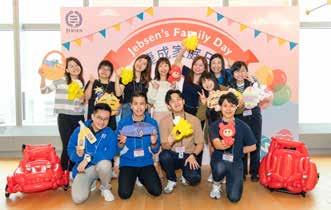
As a prestigious brand builder and investor for over a century, the Group believes that an engaging workforce is the best storyteller of its brand story.
The evolving role of HR to accelerate people and organisational development

As a people-first company, the HR function plays a crucial role – it acts as an expert advisor on business matters, facilitates clear and consistent two-way communications between management and employees, and aligns employees to the company’s objectives and impact.
Evolving from a ‘business enabler’ to a ‘business accelerator’, with a greater purpose to achieve sustainable growth of people and organisational development, Jebsen’s HR creates new opportunities for innovating employee experiences, streamlining processes, and building new business intelligence through HR digital transformation, while the senior management is charging forward with agility and versatility.
Having emerged from a family-owned shipping business in 1895 and having navigated through a century-plus journey, Jebsen Group has never ceased to make progress. Through courage, creativity, diligence, tenacity, and entrepreneurship, the Group has now developed into the most-respected brand builder and investor in Greater China, housing more than 2,200 staff across 11 cities in Greater China and carrying over 200 of the world’s leading lifestyle brands such as Porsche, Blue Girl, Bollinger, Casio, etc.
Jebsen’s success has been achieved by investing in its most valuable asset – “PEOPLE”. By always putting employees first, Jebsen strives to build a great workplace that inspires collaboration and happiness. The company’s golden rule is a “ME” to “WE” equation that starts with human interactions, which has helped cultivate a family-friendly culture at Jebsen.
Starting with the hardware, Jebsen moved to a new office in 2021, and prioritised employee experience through redesign. One highlight of the new office is an interconnecting staircase which, all the way through its three floors, joins together to facilitate communication among employees from different business lines and departments. Complemented with an agile working space on each floor and smart facilities, the new office aims to facilitate cross-team collaboration and synergy in an inspiring and agile workplace.
On the software side, underpinned by the 3Cs of its engagement strategy: cares (wellbeing), cheers (having fun), and celebrates (milestones & accomplishments), Jebsen undertakes various initiatives to fuel employees on a daily basis – be it through the physical working environment, wellbeing, learning and career development, recognitions, and even their families.
These initiatives include the ‘Employee Abundance Programme’ (EAP) and the launch of ‘Wellness Month’ to support staff and promote wellness; a ‘CEO Townhall’ and the ‘Lunch with CEO’ programme to give staff and the CEO more chances to bond and communicate; celebrating big wins to appreciate the little things made by every ‘Jebsen Hero’; as well as different leisure classes, sports training and charity runs to create fond memories while having fun, thus covering employees’ all-rounded needs.
“Engagement stems from trust, and trust is accumulated by dialogue and consistent positive employee experience along the employee life cycle,” Sara Ho, Group Chief Human Resources Officer, Jebsen Group affirms. “Above all, authenticity and care matter most.”
Following the Group’s Vision 2025, an action plan for Jebsen to evolve and adapt to change to achieve further success, Jebsen HR is focused on two deeply interlinked areas — systems and processes, as well as people and culture. “Successful digitalisation relies more on the human factor than the technology piece. Having systems and processes in place is just the foundation, because it is the people and culture that determine how effectively the technology will be used,” Ho emphasises.
In essence, to Jebsen, HR digital transformation is people transformation. Therefore, robotic process automation (RPA) has been implemented to automate manual and repetitive processes, allowing HR to focus more on employees’ satisfaction and career paths. A powerful HR portal named ‘Jeb Link’ has been launched to digitalise the entire employee lifecycle, with the establishment of online platforms to augment employee learning. Further, wide-encompassing dashboards offer instant and valuable analytics to managers and management for data-driven decision-making.
“Digitalisation is about people. Systems and technologies are just tools that we can use to solve people’s problems and make their lives easier or better. In HR, we must still take a people-first perspective but add a data-driven view to that,” Ho says.
As Jebsen moves steadily towards achieving Vision 2025, Ho believes HR should continue helping to prepare the company and the people by building an agility mindset and being trained for unexpected situations; playing an important role in staff communication to ease people’s minds and make them feel connected to the company and each other; and raising employees’ engagement and boosting their mental health.
“When the company puts employees first, they take more initiatives and proactively bring about change and business benefits through their endeavours. This process of reciprocity reinforces a culture of growth and autonomy in response to macro challenges,” she concludes.
H1 2023 « Human Resources Online Hong Kong « 3 THIS ARTICLE IS BROUGHT TO YOU
BY JEBSEN GROUP
Tim Warwick, Vice President of Franchise Operations, Hong Kong, Taiwan, Macau, and Mongolia, The Coca-Cola Company
Being associated with one of the great brands in the world for 16 years, Tim Warwick believes the magical recipe for the company’s continuous success is a simple mix of the right ingredients – a good company, the right products, and great talent.
The opportunity to build brands, choices, and products that people love while refreshing the world and making a difference has kept him excited and motivated to go to work every day; while the associates, who he describes as “bright, capable, inspiring, and enjoyable” to work with, have filled his days with fresh thinking and new ideas.
Tracy Chan finds out more about his secret ingredients to make Coca-Cola a great place to work.
With a remit across Hong Kong, Taiwan, Macau, and Mongolia, what do you see as similar and/ or different talent priorities in various markets and how do you address these priorities? In general, while our associates in different markets have varied priorities, there is one thing that is similar across the board and that is that Coca-Cola associates, as individuals, are eager not only to learn, but to contribute.
When coming to interview for a role at Coca-Cola, many applicants are gifted and very creative, and already motivated. They know about the brands, they know what the brands have been doing and, most of the time, they are fans and they are eager to inject new ideas.

Although the brands have a long-standing heritage, we are also famous as a relentless innovator and for being open to new ideas to engage with our valued customers and loyal consumers. Across all markets, our people are the ones responsible for promoting and safeguarding our brand image and proposition.
Coca-Cola Hong Kong has been recognised as one of the great places to work. Could you highlight some best practices that have helped foster a positive work experience and company culture?
At The Coca-Cola Company, we believe in the power of human potential, and thus are committed to recruiting and nurturing the best local and diverse talent to help us all thrive, and to providing our people with an unmatched career experience that is highly inspiring, engaging, and fulfilling.
This Great Place to Work Certification™ is an acknowledgement of our ongoing dedication to the employee experience, which is tremendous because it’s the only official recognition determined by our associates’ real-time reports of our company culture.
As a Great Place to Work, Coca-Cola empowers associates to refresh the world and make a difference in people’s lives, communities, and our planet by building loved brands together in a diverse and supportive workplace. We enable this with an agile team structure where associates have opportunities to rotate to other teams or even regions to gain experience on different brands.
With a networked system, working at one office in Coca-Cola means you will have a chance to work on a dozen different brands, from sparkling beverages, tea, water and juice, to sports drinks, and more.
The Coca-Cola Company has businesses all over the world. How do you ensure the company culture is consistent across all markets, especially in your role managing franchise operations?
It is important to set a clear vision and goals across all markets while allowing each market to adopt their own style. Being consistent doesn’t mean it must be identical.
In The Coca-Cola Company, we believe in diversity. A culturally diverse team enables more creative and innovative discussions and often produces better results than you can imagine. A lot of the time, we have campaigns and/or strategies coming from a regional or global level, but we always keep in mind to allow space for local adaptation or interpretation that is the best fit for an individual market.
How would you describe your leadership style?
My leadership style can be described as authentic, open, and enthusiastic. One of the most important capabilities of a leader is to nurture others to their fullest potential, something I have enjoyed most during my career. I strive to see the unique abilities of each team member and help guide people to better themselves and improve their career
» Human Resources Online Hong Kong » H1 2023 4 WORK LIFE » Leadership
trajectory. I find that by leading this way, we retain staff much longer, and productivity increases.
It’s a journey and a collaborative team effort when it comes to team engagement. That’s why everybody here in the organisation has been contributing his/her own share in building a caring culture and an exemplary workplace. We’ve been building a great place to work and weaving associate engagement into the fabric of everything we do, day in and day out, embedding it into how we refresh the world and make a difference.
How closely do you work with your HR team, and on what matters?
What’s unique in our Coca-Cola office is that apart from a CHRO or an HR strategic partner role, we have everyone involved in terms of associate engagement. We have a group we call ‘iCare Agents’, who are volunteers from our team to help organise team engagement activities for all – really by our people and for our people. By so doing, people show a high degree of passion in associate engagement.
What, in your view, is the No.1 challenge to creating a workplace that can attract, engage, and retain top talent? Please share your ways to tackle it.
Similar to our drinkers, one of the challenges to retaining talent is keeping them engaged and feeling empowered. At Coca-Cola, associates are always looking for new things to do or get involved in. Our company structure and opportunities match exactly with their expectations – allowing not only cross-functional collaboration, but also working on projects at a regional, the operating unit, or the global level.
Ours is really a platform for our associates to realise their full potential. We are a great workplace where the company is always ready to go ‘above and beyond’ to support our associates’ development, growth, and success. This is what, at the end, attracts and retains top talent.
Sustainability has been a priority for CocaCola. Could you share some highlights, in addition to social and environmental sustainability, on strategies or plans in place to support the sustainable development of both the company and associates?

As part of our ‘World Without Waste’ commitment, we aim to help collect and recycle the equivalent of 100% of the bottles and cans we produce by 2030. We’re also working to: make 100% of our packaging recyclable by 2025; use 50% recycled material in our packaging by 2030; and have at least 25% of our beverages sold in refillable/ returnable packaging by 2030.
In Hong Kong, our associates are also highly involved in initiatives that will help make a difference in people’s lives, communities, and our planet. For example, they were involved in launching Bonaqua’s first individual sale labelless bottled water anywhere in the world across all channels in Hong Kong in 2022, which improves bottle recyclability and reduces the use of plastics. This follows the brand’s multi-year effort in adopting lighter bottles, and using 100% rPET for the production of its bottles.
We have been organising beverage packaging collection and public education programmes by working together with our bottling partners, industry consortiums (like ‘Drink Without Waste’) and other industry peers (including recycling facility New Life Plastics), to help create a closed loop system to extract the maximum value from used beverage containers.
We acknowledge that close partnerships across business, government, and civil society are fundamental to achieving our ‘World Without Waste’ goals.
What is the one thing you’ve learned or piece of advice you’ve received coming up the ranks that you try to pass on to your team?
My own career and leadership style has grown under the mentorship of a number of strong leaders, and sometimes this can be enriched by how you work together with your peers and every team member. Being prepared to nurture those around you to achieve their full potential is probably the best piece of advice I could ever pass on to my team.
Wellbeing is one of the key factors in promoting a positive workplace. How do you prioritise the wellness of your associates and yourself?
Competitive compensation packages and benefits, flexible working hours, work-from-home options for our associates as needed to take care of their families, fun and engaging team activities to celebrate key milestones, and importantly, incredible space and opportunities for professional and personal growth and development – these are among the things people enjoy as part of the exciting career experiences at Coca-Cola.
In everything we do, we strive to build and encourage a high-trust, highperformance culture that can bring the best out of the best talent in the market.
Staying healthy and fit is one of the most important things and something our company puts great emphasis on. Work-life balance is not only about the time invested in work versus personal life, but also whether or not our associates feel they are being supported in their work.
That’s why we offer flexible working hours and even locations for our people to choose from if family or personal matters come up. We also adopt an open office design where there are no private offices to encourage collaboration between teams.
For wellness, we often involve exercises in our team building activities. All in all, we want to create a positive working space where everyone feels supported, just like a family.
H1 2023 « Human Resources Online Hong Kong « 5 Leadership WORK LIFE
15 minutes with
LUCIE EDWARDS
CHIEF PEOPLE OFFICER HOME CREDIT GROUP

In your opinion, what are the most pressing talent challenges that the industry needs to address immediately?
HR in the financial sector faces several talent challenges. Firstly, a shortage of skilled professionals, particularly in areas such as data analytics, cybersecurity, and digital marketing. Secondly, there is a need to build a more diverse and inclusive workforce, with a focus on promoting gender and ethnic diversity as well as improving representation at senior levels. Thirdly, we should develop more agile and adaptable talent strategies, given the rapidly changing nature of the industry and the increasing need for digital transformation.
HR leaders should focus on developing new ways of attracting and retaining top talent, including offering more flexible and remote work options, investing in employee development and training, as well as creating a positive workplace culture that fosters innovation, collaboration, and growth. By addressing these talent challenges, we can position our organisations for success.
Talent and skill shortages have been a real worldwide concern across all sectors. Could you share the strategies you have used to secure the most needed talent and skills for Home Credit?
In order to secure the most needed talent and skills at Home Credit, we identify the key competencies required and develop a comprehensive recruitment strategy to attract and retain top talent. This includes leveraging social media and professional networks, partnering with universities, as well as offering competitive remuneration and benefits packages.
We create a positive workplace culture that fosters collaboration, innovation, and growth. As well, we invest in employee development and training programmes to upskill and reskill employees to ensure that the organisation has the necessary skills/talent to adapt to the rapidly changing industry landscape.
Last, but not least, using data analytics and metrics to measure and track employee performance and engagement can help identify potential areas of improvement and improve future talent strategies.
The financial industry has long been seen as a male-dominant sector, how do you build a level playing field for everyone?
Fostering an inclusive workplace culture is crucial, not just in terms of gender, but also diverse cultural backgrounds, ages, minorities, etc. To promote diversity at all levels of the organisation, we create awareness where relevant, and with ongoing reporting/visibility, we check that the situation is improving.
It’s important to have transparent hiring and promotion policies, providing equal opportunities for training and development, and implementing a zerotolerance policy for discrimination or harassment. It is also useful to create a flexible and supportive work environment that accommodates the needs of all employees, including working parents, caregivers, and those with disabilities.
By creating a level playing field and fostering a truly inclusive workplace culture, our organisation can not only attract and retain top talent, but also drive innovation, creativity, and improve the overall business performance.
Is there a phrase/mindset that you believe HR professionals should do away with? And what should they replace it with?
The one phrase I advocate that we stop using is: “We’ve always done it this way.” This mindset can lead to complacency and resistance to change, which can hinder innovation and growth.
Instead, we should adopt a growth mindset, which involves a willingness to learn, adapt, and experiment, even in the face of uncertainty or failure. By embracing a growth mindset, HR professionals can challenge traditional practices, identify new opportunities for improvement, and drive meaningful change within their organisations.
We should all prioritise a culture of continuous improvement and innovation, encourage all employees to contribute their ideas and perspectives, and foster a sense of ownership and accountability for driving positive change.
Concluding the interview on a funny note, if not in HR, what is another career you would have chosen?
My husband says I should have been an interior designer. And there is actually a connection, I might consider myself being a “people’s designer” – someone who designs spaces for human interactions and connections.
Just like an HR manager, a people’s designer needs to understand the unique needs and preferences of each individual, while also considering the overall atmosphere and vibe of the space. And just like an interior designer, they will need to be creative, innovative, and able to think outside the box to create truly unique and inspiring environments.
» Human Resources Online Hong Kong » H1 2023 6 WORK LIFE » Snapshot
...
UNLOCKING ENDLESS POSSIBILITIES: DFS GROUP REIMAGINES EMPLOYEES’ CAREERS WITH AGILITY AND FLEXIBILITY
Established in 1960 and a proud member of the global Moët Hennessy Louis Vuitton (LVMH) family since 1996, leading luxury travel retailer DFS Group curates exceptional products from over 750 of the most desired brands across the world’s most visited airports and downtown locations. With global headquarters in Hong Kong, DFS’ success story has always had people at the centre.
DFS strives to improve the employee experience and drive business imperatives to attract and retain talent against the backdrop of a fast-changing business landscape, endemic skill shortages and an intense race for talent. At the same time, DFS seeks to cultivate a future-ready workforce by focusing on what matters to its people by building a robust talent strategy to elevate the ‘3Cs’ – Careers, Capabilities and Culture.

This starts by providing a dynamic career experience and democratising professional coaching and mentoring. Through a programme called ‘GROW with DFS’, the group unlocks the full potential of proactive career management through intra-functional, inter-functional and geographical mobility, as well as short-term and permanent assignments within the LVMH family. The programme offers toolkits, training and career talks hosted by senior leaders, ensuring line managers and employees are equipped with the proper tools and skills to drive career development.
DFS has also partnered with a global provider of digital coaching to launch ‘Coaching by EZRA’, which is accessible to a broad population at all levels across the business and enables unlimited coaching that is designed to facilitate the most impactful development goals tailored to each individual. Line managers are involved at key points to identify goals and recognise behavioural changes. Ongoing support is also provided to employees with analytics and qualitative feedback.
Other robust initiatives have been established on a global level to engage various talent groups and provide them with unique development opportunities. For early career professionals (ECPs), DFS has launched the first-ever ‘Global ECP Forum’ and ‘ECP Learning’ sprints. On the other hand, a 12-month ‘Global Mentoring Programme’ has multiple supporting checkpoints including mentor and mentee orientation, learning sessions after three months and regular surveys to proactively track participants’ satisfaction and progress.
At the heart of it all, the success of career development lies in the culture of the team. DFS is moving away from traditional job descriptions which
are inconsistent with today’s ways of working and rate of change, and instead fostering a more agile, collaborative culture with flexibility.
The ‘Strategic Engagement and Employee Experience’ team, an entirely new HR function, was created in early 2022. By taking an employee-centric approach, the team listened through holistic communication channels including global town halls, CEO communication sessions, an employee engagement survey ‘Voice of DFS’, and employee focus groups. Their task was to specifically address the concerns and needs of the workforce and elevate the employee experience.
Based on findings from the listening exercises, a new flexible workplace model – ‘#Reimagine Ways of Working’ – was designed. It enabled employees to enjoy flexible start and finish times, working from home up to two days per week, a reimbursement of up to US$750 to purchase home-office equipment, with non-local employees having the opportunity to work in their home country for up to six weeks, and ‘Summer Fridays’ for local colleagues who are unable to work remotely.
While embracing flexibility, employee engagement hasn’t been out of sight. Initiatives such as enhanced technical support and resources, specially designed collaboration areas in the office, and even a pilot micro-recognition programme in collaboration with PraisePal have been implemented to maintain employees’ efficiency, morale and culture.
The flexible work model created by DFS has yielded positive results, including increased productivity, employee wellbeing and overall job performance. Due to its popularity and success, an updated remote working programme was introduced in 2023, catering to both expats and locals.
Moving forward, DFS is introducing its new employer value proposition (EVP) globally through a comprehensive activation to attract, retain and develop the best talent in the market and provide a renewed sense of belonging to employees.
“Joining DFS means journeying into a world of possibilities unlike anywhere else. It is a place where you can aspire for growth, immerse in luxury, experience the world and build lasting connections,” Alex Richardson, Executive Vice President, Global Human Resources, DFS Group (pictured), illustrates.
“As we fuel our growth with new brands and new locations, the stage is set for like-minded people to join and grow with us. Your passion for luxury, travel and retail can combine to help you build an agile career in a dynamic business which is proudly part of LVMH, the family-owned group of world-leading luxury brands,” Richardson concludes.

H1 2023 « Human Resources Online Hong Kong « 7 THIS ARTICLE IS BROUGHT TO YOU BY DFS
GROUP
‘Grow with DFS’ for line managers to support career development in their teams, ‘Coaching with EZRA’ to democratise development through coaching, and transformative flexible working programme ‘Reimagine Ways of Working’ are some key people pillars for the luxury retailer.
EXPECTATION GAP IN BENEFITS EXISTS BETWEEN EMPLOYERS AND EMPLOYEES
Hong Kong – To stand out from the competition, an increasing number of employers in Hong Kong are targeting an ‘above market’ benefits position to attract top talent despite rising costs, according to the 2023 Benefits Trends Survey by WTW.
According to the study, more than three-quarters (77%) of employers in Hong Kong see competition for talent as the number one business issue influencing their strategy in employee benefits in 2023, followed by rising costs (64%), and the cultural shift towards flexible work (28%).
When considering benefits strategies, employers cite managing plan costs as the key area of focus (74%), followed by industry benchmarking to understand their benefits competitiveness (47%), and improving employee wellbeing (45%).
In the race to expand benefits, Hong Kong employers are prioritising the provision of health benefits (82%), risk and insurance benefits (43%), and career, training and development (43%). However, a separate survey of employees found that there may be a misalignment between employers’ and employees’ expectations. The survey showed that employees prioritise retirement plans/long-term financial incentives and flexible work arrangements (both at 38%), followed by health benefits and support for their benefits decisions (both at 33%).
The results of the Hong Kong survey mirror the views of employers from the wider Asia Pacific (APAC) region. Respondents identified a need to improve all areas of their benefits strategies over the next two years to elevate employee health and wellbeing.
Some of the key findings in APAC:
• Close to one-third (31%) of APAC employers said they are looking to improve the positions of their benefits in financial wellbeing/short-term finances, followed by mental health support (28%), and retirement plans/long-term finances (27%).
• Employers are also putting greater emphasis on diversity, equity, and inclusion, with more than half (57%) planning or considering conducting a review of their inclusion and diversity benefits.
• Employers are taking more aggressive actions to manage the budgets of their benefits programmes, with 71% of APAC employers planning to improve contract terms with their vendors, while over half (56%) are looking to secure additional funding for their benefits programmes. Two in four (44%) plan to expand the use of risk financing arrangements, and 37% plan to increase the employee share of cost.
• Nearly half (48%) of APAC employers are also planning or considering more tools and services to help employees choose the best options when using their benefits.
» Human Resources Online Hong Kong » H1 2023 8 WORK LIFE» Whitepaper
OCBC HONG KONG BUILDS A SUSTAINABLE BUSINESS TOGETHER WITH EMPLOYEES AS ‘ONE’
smooth business operations and at the same time putting employee’s health and safety as top priority.
A holistic programme was rolled out to extend full support to employees during pandemic, which included:
• Vaccination day off & vaccination transport reimbursement,
• Medical leave & consultation reimbursement,
• Distribution of masks, hand sanitiser, RAT packs,
• Various health & COVID-related talks,
• Regular deep cleaning of the workplace,
• Additional medical protection and financial support against vaccine side effects,
• Smart casual dress option for staff,
• Hybrid work arrangement.
The Bank also supported the community in its anti-pandemic efforts, which included:
As a wholly-owned subsidiary of OCBC Group, which is the second-largest financial services group in Southeast Asia by assets and one of the world’s most highly-rated banks, OCBC Hong Kong believes employees are important assets to achieve business growth and sustainability. As such, developing a future-ready and high-performing workforce has always been its top priority.
To build the Bank together with employees, OCBC Hong Kong is committed to strengthening its people assets and culture to nurture a learning organisation where people contribute to the Group’s success and each other’s growth. “We focus on future and sustainable banking needs in the VUCA world (volatility, uncertainty, complexity, ambiguity) and support our employees to upskill and reskill in meeting personal and corporate growth,” Cindy Leung, Head of Human Resources, OCBC Hong Kong, stresses.
Therefore, under its ‘Future Smart’ framework, OCBC Hong Kong has curated various targeted learning initiatives to transform workforce capabilities, upskill and equip employees with generic, technical and leadership competencies, and help them achieve their career aspirations with the support of the Bank.
To this effect, the Bank has democratised learning by introducing the selfdriven mobile learning application ‘HR in Pocket’ (HIP) to empower employees to learn anytime and anywhere. The Human Resources (HR) team has also created an enhanced competency framework to provide a systematic learning roadmap and professional accreditation. To further promote collaborative learning, OCBC Hong Kong has scheduled ‘Learning ThriveDay’ on the second last Friday of each month as well as forged ahead with the ‘Future Smart Learning Festival’, which brings employees in different entities together to learn and work on thematic topics.
All the efforts to cultivate the learning culture have been widely supported by the leadership. At OCBC Hong Kong, leaders play a crucial role as mentors, sponsors, and co-creators. They share their experiences and insights with employees, and act as role models to keep employees motivated and engaged.
Employee wellness is one of the pillars of its HR strategy. To cope with the outbreak of COVID-19, the Bank had reacted fast in order to ensure
• Providing free cleaning and disinfection services for NGO, nursery schools, kindergartens and primary schools;
• Donating anti-epidemic items to an NGO that provides rehabilitation services and facilities to people physically and mentally challenged due to neurological impairment; and
• Adjusting branch operating hours.
The success of the learning strategies and the Bank’s response to the pandemic have been well-proven by numbers: overall employee engagement rose by 8%, average training hours per staff increased by 87.5%, staff training expense on upskilling with future workforce capabilities went up by 122.54%, and a 100% participation rate for the organised wellness programmes (e.g., anti pandemic fatigue series) has been achieved.
As a reputable bank with a network of 40 branches and offices in Hong Kong SAR and Macau SAR and more than 2,000 employees in Hong Kong alone, the Bank believes there is no one-size-fits-all HR strategy. The key is to take different needs and perspectives into consideration to design more diverse initiatives to fulfil the different needs of employees of different generations.
As the role of HR continues to evolve, Leung stresses that HR should remain agile and innovative in driving and supporting HR transformation and coping with the changes in the banking industry.

“Think and act like an entrepreneur, be more explorative with no fear of failure, and try new things,” she affirms. “Stop having a fixed mindset which prohibits innovation. Be less conservative and be brave enough to take on further challenges.”
She further reiterates that it is important for the Bank and its employees to grow together hand-in-hand, bringing out the best in employees and enable sustainable business performance “For now, and beyond.” (OCBC’s tagline)
H1 2023 « Human Resources Online Hong Kong « 9 THIS ARTICLE IS BROUGHT TO YOU BY
KONG
OCBC HONG
A future-ready and high-performing workforce is driving the bank to long-term success.
HONG KONG’S GRADUATES ADMIT THEY WON’T STAY LONG IN THEIR FIRST JOB
According to a recent career survey by CFA Institute, Hong Kong’s graduates have a positive outlook about their future careers. Over three quarters (76%) said they know what employers are looking for in graduate employees, showing a substantial boost in confidence compared to 46% saying the same in 2021.
67% of graduates in Hong Kong said they feel confident about their future career prospects.
Over half (53%) of Hong Kong graduates intend to stay in their first job for
one to two years only.
consider themselves to have better career prospects than their parents’ generation
44% Flexible working arrangements
have become a popular option for graduates – over half (51%) said they prefer complete flexibility on working in the office or remotely, and 45% said a hybrid work environment is preferred.
» Human Resources Online Hong Kong » H1 2023 10 WORK LIFE » HR by Numbers
CFA Institute’s 2023 global Graduate Outlook Survey collected data during 12-24 April 2023 from 9,437 respondents, aged 18-25, who are studying for, or have graduated with a bachelor’s degree or higher within the past three years.
INSPIRE TO ASPIRE: HONGKONG LAND’S WINNING STRATEGY TO BUILD A BETTER WORKPLACE
The premium property developer’s mission is to build long-term value for all stakeholders, including its people.
Employee recognition programmes at HKL include the global ‘Our Heroes Recognition Programme’, the monthly/ quarterly ‘Employee Recognition Programme’ for administrative staff, the yearly ‘Long Service Awards’, and the ‘H Points’ incentive redemption to reward those who have participated in designated company activities. All these initiatives contribute to cultivating a culture of appreciation and recognition among staff across levels and departments.
With a long-standing history, Asia’s leading property investment, management, and development group Hongkong Land (HKL) prides itself on its innovative mindset and is committed to inspiring, supporting, and empowering the communities of today, enabling everyone to aspire to a better tomorrow together.

With a strong portfolio principally in Hong Kong, Singapore, Beijing, and Jakarta, HKL’s vision is to be the best-in-class property company that inspires and builds value for Asian cities. Essential to achieving this lies in its people. With this in mind, HKL has built its HR strategy upon the company’s values ‘HEROES’, namely “Honesty & Integrity”, “Excellence”, “Responsiveness & Agility”, “Open & Collaborative Culture”, “Environmental & Social Responsibility”, as well as “Smart Innovation”.
“We are committed to cultivating a winning culture and offering a work environment where our staff are valued and nurtured,” Yolice Wu, Executive Director, Human Resources, Hongkong Land, affirms.
Aligning with its newly revamped company purpose, vision, mission, and values, HKL has curated various initiatives to make employees work happily in the company with substantial career prospects. One heavily-invested-in area is digital learning and development to cultivate a learning culture and help employees establish learning habits.
A 24x7 e-learning platform ‘Connect’ was therefore launched. The platform integrates internal learning programmes and external learning platforms, such as LinkedIn Learning and Go1, allowing employees to access over 1,000 learning programmes via the web and a dedicated mobile application anytime, anywhere. After the launch of the platform, 60% of the training hours have comprised online training, and the number of online training hours has increased from 41,933 hours in 2021 to 63,009 in 2022.
To build a happy and healthy workplace, HKL also puts a strong focus on employee engagement and wellbeing. Apart from ensuring a diverse and inclusive work environment to treat every employee fairly, regardless of their gender, age, race, ethnicity, physical ability, and sexual orientation, HKL never holds back on giving credit and recognition to those who demonstrate company values, have outstanding performance, or make contributions to the company.
To enhance employee wellbeing, HKL’s ‘Healthy Land Happy Land’ wellness programme encourages exercise and activities to promote physical, mental, family, and workplace health for all employees. The programme includes physical and mental health talks, exercise classes, workshops, alerts on health news and tips, healthy recipes, and 24-hour counselling and consultation hotlines.
HKL’s efforts have paid off, with accolades at the recent Employee Experience Awards 2023 in Hong Kong – a silver award in ‘Best Rewards and Recognition Programme’ and a bronze award in ‘Best Digital Learning Transformation’. “Having won these two awards is truly a recognition of our great efforts spent in creating the best workplace for our people,” Wu says.
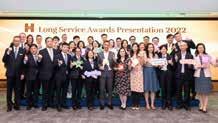
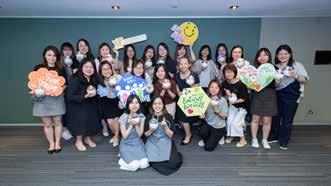
“Thanks to HRO for presenting these prestigious awards to us. We are honoured that the great work done by my HR team is being recognised. In the future, we will continue to strive our best to create an even better workplace for all Hongkong Land staff.”
To support its aspiration, HKL has transformed the HR function to become a strategic partner of each business team in the organisation. “We see that the HR department continues to evolve by adding more value to the company through initiatives that help attract new talents, as well as develop and retain our existing talents. The role of HR will become even more critical in the coming years as we face the various challenges in the business landscape,” Wu continues.
“Therefore, the HR department will need to become more proactive in areas such as talent development, diversity and inclusion, technology adoption, and change management, etc., so as to retain more talents to help the company cope with the challenges that we may face in the future.”
Most importantly, with its many great talents, HKL is better positioned to enhance the company’s capability and performance to achieve sustainable growth.
H1 2023 « Human Resources Online Hong Kong « 11 THIS ARTICLE IS
TO YOU
BROUGHT
BY HONGKONG LAND
EQUALITY = EQUITY
Though often used interchangeably, equality and equity are two different concepts. HRO hears from 13 female leaders across North Asia to understand how to find the balance in embracing both equity and equality in the workplace, and even in their personal lives.
Chelsea Perino Managing Director, Global Marketing & Communications The Executive Centre
In recent years, awareness around diversity, equity, and inclusion (DE&I) has been increasing in the working world. Companies strive to create a level playing field where everyone has the same chance of success. Having said that, is providing the same resources or opportunities good enough to empower every individual?
Many leaders we have talked to have reiterated that each employee has different needs, either personally or professionally. Instead of treating everyone the same, it is more important to recognise and understand their circumstances and provide them with the support that caters to them the most to help them bring their best selves to work and unleash their potential.
In this special feature, HRO talks to 13 female leaders across Hong Kong and Taiwan, who share how they are embracing equality and equity in the workplace, improving equity for women in their sector, and how embracing equity has impacted their lives.
Chelsea Perino, Managing Director, Global Marketing & Communications, The Executive Centre

comes from different circumstances thus the path to reach an equal outcome on an individual level is not the same.
Everyone requires support in different ways to feel they’re working on an equal playing field. As leaders, we must take the time to get to know all our people, and to provide an environment that empowers each of them to make choices that are right for them personally, not just for the team or the organisation.
Education and programming, especially for senior management, is essential for ensuring that diversity, equity, and inclusion isn’t just an agenda item to tick off, but is an integral part of every organisation’s business strategy.
Alice Ting, Managing Director of Hong Kong, Telstra
 Managing Director
Managing Director
Equality isn’t a new theme – people across the world have been fighting for the right to equal opportunities for generations. But access to the same resources isn’t enough. Equity takes this important discussion a step further because it is deeply personalised. Equity recognises that each individual
Equity and equality are both extremely important in the workplace. At Telstra, for example, we strive for equity by providing accessibility support for colleagues with disabilities, and
» Human Resources Online Hong Kong » H1 2023 12 FEATURE » Women Power
Alice Ting
of Hong Kong Telstra
Yoko Fung Head of Account Management Deliveroo Hong Kong
Ada Fung Executive Director, Head of Advisory & Transaction Services – Office Services CBRE Hong Kong
flexible working models for all employees. We recruit, develop, promote, and pay our people in a way that supports our commitment to being diverse and inclusive.
Gender pay equity continues to be a key area of focus. We consistently assess our conduct to avoid any bias in performance, assessment, and remuneration decisions.
Telstra promotes equal opportunities for all backgrounds – be it age, beliefs, ethnicities or gender orientations. We make diversity part of our everyday conversations to set an example and lead the telecoms industry towards an equity-based and inclusive community.
Yoko Fung, Head of Account Management, Deliveroo Hong Kong
At Deliveroo, we want women to feel empowered to join us, whether they’re pursuing careers in tech, sales, operations, or any of the other myriad of roles we offer in our office.
It’s my responsibility to raise our employees’ self-awareness and make them proud of who they are. This is the first step a leader can take to improve equity. Many women across Asia have been raised in conservative cultures that advise them to be humble. By establishing Roo Academy in Hong Kong, I wish to take the lead in challenging old norms and encourage women in our office to speak up and advocate for more.
Marie Claire Lim Moore
Asia Pacific Regional President and Hong Kong CEO TransUnion
Ada Fung, Executive Director, Head of Advisory & Transaction Services – Office Services, CBRE Hong Kong
Improving women’s equity in real estate is not much different from other traditionally male-dominant industries, it needs to be done in the right way, across different levels, regularly, and consistently, to ensure the balance and inclusion of both genders is suitable and sustainable in the longer run.
Business leaders should always seek to strike a balance of gender and diversity amongst leadership teams to allow diverse opinions to be heard, and to ensure robust governance and processes are in place during candidate selection, such that women can be given equal opportunities even for business lines that are traditionally dominated by men.
Janice Siu Managing Director, APAC Growth Landor & Fitch

As a manager, we should encourage individual female team members to speak up, not just in meetings, but also in traditionally male-dominant settings such as construction sites. As a woman, we should look to promote gender equality given the opportunity, but be mindful of not overplaying the agenda. This way, diversity and equity will simply be a norm and become natural to anyone in any sector of business.
Marie Claire Lim Moore, Asia Pacific Regional President and Hong Kong CEO, TransUnion
I see gender equity and equality as strategic imperatives for business, as increasingly more research shows a correlation between business performance and DE&I. Advancing women in business requires building a strong pipeline of talent.
Young women talent should be given the opportunity to take up more prominent roles and responsibilities at the workplace, especially in traditionally male-dominated sectors like financial services. Influential female – and male – executives in Hong Kong need to take up the initiative to pave the way for those that do not have accessibility to the roles they deserve.
As a CEO, I’m committed to building a pipeline of female talent at TransUnion and continuing my work to advocate women’s empowerment in the wider business community, whether it’s through DE&I policies, training, mentorship, or broader community work.
Janice Siu, Managing Director, APAC Growth, Landor & Fitch



I feel incredibly honoured to champion the first employee-led initiative on gender equality in the region at Landor & Fitch. ‘Building To Belong’ aims to create a safe and inclusive environment for employees to discuss meaningful gender equality topics, support the career development of our female talent, enable them to grow within the network, and empower them to navigate gender bias in their career journey.
As a leading brand transformation agency in the creative industry, it fills me with pride to say that 53% of our leadership positions are filled by female employees, and 63% of our total employee population is female. Diversity and equality are core to our culture and a truly diverse workplace makes a positive difference every day. I’m grateful to be part of an organisation that values and celebrates diversity.
H1 2023 « Human Resources Online Hong Kong « 13 Women Power FEATURE
Victoria Allan, Founder & Managing Director, Habitat Property
Habitat has been a female-led company since the very beginning and currently 85% of our employees are women, although people may think that the real estate industry is male-dominated.
When I started Habitat I realised there were many women that came to Hong Kong as trailing spouses that were overly qualified and wanted to work and have a rewarding career. Since then, I’ve offered many people the chance to retrain as a property agent to have a second rewarding career that is also financially attractive.
I also offer a working environment that provides a lot of flexibility to women, with flexible hours and working locations, so that employees can work in the office and have an allocated desk, but all our systems enable you to work at home when required.
We expanded the business with a new office in Stanley in 2021 which also benefits team members who live in the Southern District. As many of our team who love the South Side have children, this office gives many the ability to work close to home. I’m happy to provide the flexibility to them and will continue building an inclusive, equal, and caring working environment at Habitat Property.
The upside of offering this type of set up for women in particular is that I have an incredibly high retention rate of staff. In the 20 years of running Habitat, I have only had two employees resign to go to competitors. Other staff have left only because they have left Hong Kong. This has enabled the business to remain much more stable through cycles, and more importantly, has created a very strong team bond which results in winning higher revenue for the business.
Andrea Randall, Partner, RPC


The two concepts – equity and equality – are often used interchangeably. Yet, as one commentator succinctly put it: “Equal opportunities is not enough”. What we thrive for at RPC is equity. It’s not enough to treat people equally, but we must acknowledge and address barriers that are in place which prevent women, and other marginalised communities, from advancing in their lives and careers.
RPC has implemented a ‘Gender Balance Plan’ which identifies areas where barriers to gender balance can occur, and has introduced steps to disrupt those barriers:
• Ensuring that all senior-level appointments have a balanced candidate list;
• Hosting events that have a balanced invite list;
• Promoting flexible, dynamic, and inclusive working practices across the firm;
• Programmes to support new parents into successfully transitioning back into the workplace.
We hope our commitment to these changes will ultimately ensure that the industry is more sustainable for the next generation.
Joyce To, Instructor, XYZ
My fairly academic upbringing is somewhat at odds with my (part-time) life as a spin (indoor cycling) instructor. Growing up, it was envisaged that I would enter some high-flying corporate job and, indeed, I embarked on a legal career in my early 20s.
When I started turning my passion for spin into a part-time gig at the boutique wellness centre XYZ, I was somewhat unprepared for the challenges that lay ahead. From the physical demands and the heavy client-facing obligations of the fitness industry, to the creative aspects of putting together a playlist and curating a wellness experience, I was definitely outside of my comfort zone.
Luckily, the team at XYZ is one that embraces equity and therefore gives me ample support to thrive.
For example, my spin classes are scheduled around my legal day job. Fellow instructors also give me specific guidance on the technical aspects of fitness teaching. In return, my experiences outside of the fitness industry contribute to diversifying the roster of instructors at XYZ. #EmbracingEquity is a two-way street!

» Human Resources Online Hong Kong » H1 2023 14 FEATURE » Women Power
Victoria Allan Founder & Managing Director Habitat Property
Andrea Randall Partner RPC
Joyce To Instructor XYZ
Lara Jefferies, Founder and Managing Director, PLUG
Throughout my career, managing people has been the most challenging, humbling, and yet rewarding work I’ve done. People management is an organic, living, and evolving process as you are working with individuals who are all at different stages of their own unique journeys. Personally, I’ve had to adopt different coaching styles and provide varied training to my team members based on their own personal needs to give each of them the best chance to grow.
There is no longer room for a ‘one-size-fits-all’ management style if we want our team members to feel heard, understood, and respected. At PLUG, like in any business, we want our team members to thrive. That means cultivating a universal mindset and culture of thoughtfulness, openness, respect, and compassion, embracing our differences as individuals, appreciating them as strengths, and creating a safe environment for people to feel comfortable expressing their individuality.
Crystal Wong, Head of Partnerships, SleekFlow


As the first female hire and the fourth member of the 104-strong SleekFlow team, I take pride in my role and see it as an opportunity to champion female talent. I believe that everyone should have equal access to resources and opportunities by advocating for individuals with a good work ethic and varied skill sets.
I have been able to work with trailblazing individuals in roles that are “traditionally” ascribed to the opposite gender. And it’s been a pleasure growing our group of female developers and regularly working with male marketers on various campaigns and events.
Apart from that, I enjoy providing mentorship to my teammates by sharing my own experiences with them and helping them achieve their personal and professional goals. I hope to shape more female leaders of tomorrow by ensuring that all members are responsible for creating a safe and comfortable workplace together.
Having being born in Taiwan, studied in the UK, and now working in Japan, it was clear to me that the pandemic had accentuated the disparities between women and men – especially in North Asia where a conservative culture is still a glass ceiling for working women. However, I believe this has raised greater awareness and I see it as an opportunity to move towards #EmbracingEquity.
At HERE, extensive efforts have been put in place to ensure that every voice counts and support is provided to individual employees based on their needs. As a female leader, I take pride in identifying barriers for women, and making the necessary changes to eliminate them so we have a more inclusive working environment.
Clare Lin, Senior Director, HRBP APAC, Yahoo Women have long dealt with an invisible culture of exclusion. Equity is the next step; recognising equality alone is not enough: it is no longer sufficient to treat everybody the same, and organisations need to provide tailored support to help everyone be successful.
At Yahoo, DEI is embedded in everything we do, from hiring to development and employee engagement. Our employee resource groups (ERG), such as the Women’s Inclusion Network ERG, support and empower employees of diverse backgrounds, helping them push boundaries within an inclusive culture.
Sabrina
Chiang, Head of Data Partnership & Acquisition North Asia/ Oceania, HERE Technologies
My grandfather was a politician in Taiwan. Growing up, I’ve had the privilege to observe the way he worked in a male-dominated political industry. That was why I decided to become a leader who breaks the gender bias in maledominated industries.

Our career development framework includes discussing the career visions and personal growth goals of each employee, beyond the template path to success – this includes how they can be their best selves at work and in their personal lives. Specifically, for female employees, we tailor the support they require in their different life stages, with the flexibility of a hybrid working model.

H1 2023 « Human Resources Online Hong Kong « 15 Women Power FEATURE
Lara Jefferies Founder and Managing Director PLUG
Crystal Wong Head of Partnerships SleekFlow
Sabrina Chiang Head of Data Partnership & Acquisition North Asia/Oceania HERE Technologies
Clare Lin
Senior Director, HRBP APAC Yahoo
CREATING IMPACT BEYOND BANKING: 6 BEST PRACTICES THAT MAKE DBS A PURPOSE-LED EMPLOYER

A bank is traditionally associated with providing its customers a sense of security and safety – at DBS Bank (Hong Kong) Limited (“DBS Hong Kong”), this feeling of ‘being cared for’ extends to its employees as well, with the purpose of growing together with employees, in both their professional and personal lives. “This is achieved by understanding their needs at different life stages, providing hyper-personalised solutions in their career development, and celebrating the moments that matter to them,” says Betty Lam, Managing Director, Head of Human Resources, DBS Bank (Hong Kong) Limited.
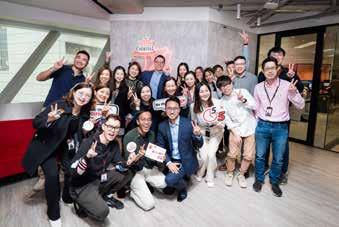
DBS is a leading financial services group in Asia with a presence in 19 markets. Headquartered and listed in Singapore, DBS is in the three key Asian axes of growth: Greater China, Southeast Asia and South Asia. The bank’s “AA-” and “Aa1” credit ratings are among the highest in the world.
Let’s deep-dive into some of DBS’ renowned talent strategies across the employee lifecycle that make it a great workplace and employer.
#1 Building a digital-led workforce by empowering employees for continuous learning
DBS’ growth & development model comprises Education, Exposure/ Experience, and Evaluation, driven by the underlying principle of empowering people to own their career development and progression. To this effect, ‘iGrow’, an internal personalised career platform was launched in August 2022. Betty explains, “Based on employees’ personal profile, ‘iGrow’ leverages machine learning and artificial intelligence to identify suitable learning and development programmes to further upskill/reskill our employees. It can also identify suitable internal opportunities that our people can move into as part of their career development.”
Additionally, ‘DBS Learning Hub’ is a one-stop curated platform offering customised and recommended skills-specific learning solutions for employees to improve on. It has combined together different learning resources such as LinkedIn Learning, book reviews, classroom trainings, e-learnings, research papers, external conferences, TED Talks and videos.
All of these contribute towards the bank’s ambition to improve workforce performance and productivity, as well as stay ahead of the exponential changes in the world’s digital, fintech, and technology spaces through innovative and immersive continuous learning and development programmes.
#2 Nurturing transformational leadership to inspire, mobilise, and enable employees
With people being the key to driving DBS towards the next horizon, the imperative falls on leaders at all levels to be equipped with the required skills and mindset. To this end, DBS’ ‘Transformational Leadership Programme’ is a multi-year campaign to provide holistic support to leaders. It is designed to strengthen managers’ capabilities via various learning programmes, encourage practices that have been learned into the daily role, seek areas of improvement via a feedback loop, make great decisions, as well as transform team effectiveness.
With leaders being tasked to play an important role to inspire, mobilise, and enable employees during the bank’s transformation journey, they are supported in three key areas:
1. ‘6 roles of DBS Manager’ – a framework that defines a manager’s role
2. ‘Leadership Skills’ – soft skills that enable managers to execute the six roles
3. ‘PRIDE!’ values – the DNA of all employees
#3 Maximising the benefits budget to offer hyper-personalised wellbeing support
DBS’ holistic employee wellbeing programme supports employees in different aspects, including their physical wellbeing through ‘iFlex’, a flexible spending account for employees to fund a greater range of expenses; their financial wellbeing through ‘iShares’, for employees to become a shareholder of the bank and share the success; and their mental and emotional wellbeing through a permanent hybrid work model enabling 40% of work-from-home, as well as ‘iOK’, a free, confidential service to employees and their dependents for round-theclock access to wellbeing support.
» Human Resources Online Hong Kong » H1 2023 16 THIS ARTICLE IS BROUGHT TO YOU BY DBS BANK (HONG KONG) LIMITED
‘Live More’ is not only DBS’ promise to its external customers, but also to its people.
As a result of these programmes, employee engagement has been on the rise since 2020, as well as employees’ ratings on wellbeing and hybrid work effectiveness. “Everyone in DBS is included and we are committed to supporting them on this journey,” affirms Betty.
#4 Enabling employees to balance their personal needs against the demands of work
As part of its wellness strategy, DBS has invested a significant amount of mindshare to flexible working arrangements. Under flexi-time provisions, DBS employees can select the working hours that best meet their needs subject to business exigencies, as long as they align with the core working hours of 9:30 am to 4:30 pm.
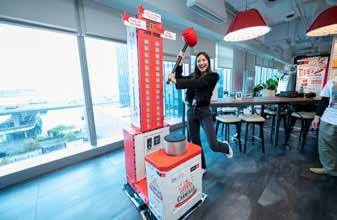
Additionally, while the permanent hybrid work model allows employees to work from home 40% of the time, a special provision to request for 100% remote working has been developed for new parents or primary caregivers for a maximum of six months. Betty shares, “All these are part of our efforts to empower our people to achieve the best of themselves.”
#5 Reconfiguring and transforming the workplace to JoySpace
The bank’s ‘PRIDE!’ values shape the way employees work with each other: ‘Purpose-driven, Relationship-led, Innovative, Decisive, and Everything Fun!’. To add to this imperative, ‘JoySpace’ has emerged as the signature DBS office – an activity-based workplace, to facilitate co-creation, ideation, and cross-team discussion. In Hong Kong, this journey started in 2019 to redesign the office for the Technology & Operations team in Kwun Tong into an agile collaboration workplace, as well as the office in One Island East into ‘JoySpace’ the following years.
Betty adds, “In this year and beyond, we target to have more ‘JoySpace’ to enable greater collaboration and ideation, and blend the best physical and virtual modes for working under our ‘Future of Work’ vision.”
#6 Ensuring full oversight and accountability for the sustainability strategy
The final part of DBS’ purpose-led business approach is ESG (Environmental, Social & Governance). Its approach to sustainability is guided by a sense of purpose: to create value for the long term, by managing business and ESG risks in a balanced and responsible way. This approach is based on DBS’ three sustainability pillars – namely, responsible banking, responsible business practices, and impact beyond banking – which enable the bank to engage with all stakeholders towards its climate goals.
As a member of the United Nations Global Compact, DBS is committed to driving progress towards the United Nations Sustainable Development Goals (UN SDGs). Among the 17 UN SDGs, DBS has chosen to focus on the six SDGs to make the most meaningful contribution in its markets of operation: gender equality; affordable & clean energy; decent work & economic growth; industry, innovation, and infrastructure; responsible consumption & production; and climate action.
To ensure full oversight and accountability for its sustainability strategy, DBS has established its own Local Sustainability Council in each core market. The Council consists of senior management members from various business and support units. It has a broad mandate to execute initiatives in line with the DBS Group’s sustainability approach while adapting to local market conditions.

“We all aspire to achieve and expect ourselves to outperform in our lives both personally and professionally. While it is important to be successful, it is more important we treat everyone with respect and dignity,” says Betty.
DBS Bank’s people practices: The role of HR


Evidently, Betty alongside her HR team at DBS Hong Kong and the wider DBS Group, have much to take pride in. Betty expresses, “HR has been the strategic partner with the business units to ensure human capital strategies are aligned with their operating needs.
“We continue to see ourselves as the guardian of DBS’ culture (sense of purpose) and value (‘PRIDE!’), which guide us through the way we do things. We thrive to create a joyful work environment where people are proud to be part of a great team, and hence creating amazing solutions and experiences for our customers that make a lasting difference.”
H1 2023 « Human Resources Online Hong Kong « 17
2023

The great talent reformation of 2023: Snippets from Talent Management Asia, Hong Kong


Driven. Energised. Motivated. That’s how you want your talent to feel as Hong Kong enters a period of recovery, with businesses looking to grab new opportunities to make up for the past three years.
But recovery isn’t straightforward – exacerbated by the talent drain, corporations in Hong Kong are struggling to hire and retain talent (new and experienced) despite their best efforts. It is time for a big shift. It is time for ‘The Great Talent Reformation of 2023’.
With this in mind, Human Resources Online held our annual flagship conference, Talent Management Asia 2023, on 7 June 2023 as an in-person, one-day event. Back after three years because of the pandemic, the conference saw more than 150 HR leaders and managers gather to reimagine their talent strategies with authenticity and resilience, as well as to enjoy the learning and networking opportunities among their peers.
With a wealth of conversations on and off stage, here are some takeaways from the event.
#1 Consider D&I holistically

Sari Suono-Rasehorn, Chief People & Culture Officer, ISS Hong Kong, grew up in the Finnish countryside and with her background, she appreciates and treats people fairly and with dignity. It’s no wonder she is such a strong advocate of driving a diversity and inclusion (D&I) strategy. In fact, with two years still to go for ISS Hong Kong’s D&I goals, the progress so far has been incredible.
The team is working on five all-encompassing dimensions of D&I:
• Generations and age
• Cultures, race, and ethnicity
• Pride


• Abilities
• Gender balance
“It is key for us to be a true partner to the business,” Suono-Rasehorn says.
“We build on our values and they are truly part of our everyday world. We believe in recognition and respect, as well as being committed to giving over 100,000 diplomas or other qualifications for employees and their family members by 2025.”
#2 Numbers tell a story
“Without data, you are just another person with an opinion. As HR professionals, we are nowadays sitting on a gold mine of data – but what we do with that data is what’s really important in order for HR to be the organisation’s secret asset,” affirms Mukta Arya, Managing Director, Chief Human Resources Officer, APAC, Societe Generale.
18 » Human Resources Hong Kong » H1 2023
SILVER SPONSOR GOLD SPONSOR EXHIBITORS
With this, she shared the four depths and varieties of HR analytics that we should be tracking (in sequence):
• Descriptive analytics – understanding what happened in the past, more static.
• Diagnostic analytics – understanding why it happened.
• Predictive analytics – understanding how (it happened) and repeating it.
• Prescriptive analytics – achieving directed and new understanding, also known as persuasive analytics.


She went on to remind us: “The reasons why we’re doing so many things in human resources is to really help the business move forward. But the fact of the matter is, you have to connect the dots and present things using data. People analytics will be effective when woven into a story, and then presented as a business solution.
“Even simple things like leave utilisation can help you unearth trends in attrition. Are people not using their leave? Does it point to a wellbeing issue?”
#3 Retention in today’s competitive market Hiring, training, and retention are the three pillars of talent management today, many of our speakers agreed. For the first, hiring is not only for skill sets, but also for culture fit. For the training, companies really need to invest in tools – they’re not just nice-to-have, but they are essential. Outside of salaries, this is where employee spend needs to be focused on – making their life easier.
Finally for retention, we need to focus on culture – who is responsible for culture, is it HR or can we do it alone? Resoundingly no – every single person



in the company is responsible for building culture. Every interaction has an effect – culture can make or break an organisation.
Flexibility to work from anywhere was another thing often mentioned in conversations, wherein panellists agreed people really enjoy the freedom and flexibility, as long as they don’t take it for granted. Thus, ground rules need to be set, for example, working in the APAC time zone especially for client-facing roles.

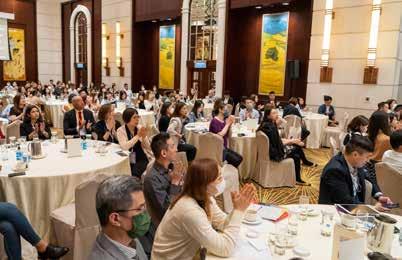
It all comes down to engagement and values. Everyone at the leadership level needs to walk the talk for it to trickle from the top-down.
#4 Living, learning, and earning longer Dorothy Chan, Vice President, Skills Transformation Global Project Lead, Schneider Electric, leads the skills transformation ambition of Schneider to define the strategy on skills management to identify, assess and develop business-critical skills for future growth, and to support employees to develop to their fullest potential.
Under her leadership, a global framework and local programmes anchored around four employee personas, has made a huge impact for the Schneider multigenerational workforce.

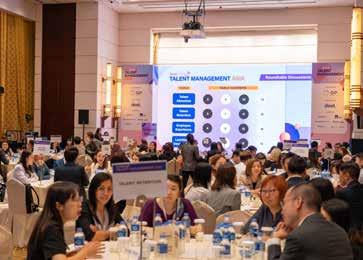
19 H1 2023 « Human Resources Hong Kong «
Her advice:
• Don’t underestimate the impact of the demographics shift.
• Understand what employees need.
• Flexibility, transparency, and psychological safety are key.
• Provide equal opportunities for all generations.
#5 Employee wellness is not measurable

Speaking from a CEO’s perspective, visiting global leader Robert Lockyer, Founder and Chief Client Officer, Delta Global, has a true passion for people. To him, people are not a measurable return on investment.
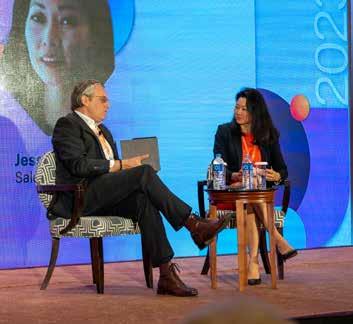
“If you are measuring people’s wellbeing, don’t bother doing it. People are neither ROI nor KPIs. People are your business,” he stresses.
“There are benefits that you can see. You can see the engagement and happiness, and the company’s success will naturally follow if you get all those things right.”
And his advice for leaders is around five key words: engage, evolve, adapt, talk, and listen.
“Always engage with your people no matter at what stage they are at in their career, and what part of the job they are in,” he says. “As a leader, if you do not adapt, your employees will go somewhere else.”
#6 From probabilities to possibilities






The world has changed. What worked before will not work today. So many of our speakers highlighted the need for HR to transform to bring a bigger impact to the business and the talent.

To transform people’s experiences, key things HR should take note of are:

• Leverage technology to get better access to data that helps make smarter decisions.

• Offer the right choices or flexibility to people.
• Listen to your talent and get feedback – what do they need? How do we get people here? How did their expectations shift?
• Support and elevate managers to be able to cope with the new normal, and be the best ambassador of the organisation.
• Make sure there is a consistent culture across each practice, and then across the entire organisation.
As we wrapped up the on-stage presentations to make room for off-stage round table discussions, Charles H. Ferguson, General Manager, APAC, G-P, signed us off on a good note, citing research and his own insights: “A lot of businesses are coming into Hong Kong and using it as a springboard to enter other parts of the world. Even so, per a latest UOB survey, more than 70% of businesses in HK want to expand to other markets.
“When it comes to talent in the region, watch this space! Hong Kong is going to come back like you cannot believe – personally, I am really excited for businesses to organically grow here and expand, but also for the inbound opportunity.”
Human Resources Online would like to give our heartfelt gratitude to all speakers, panellists, moderators, and roundtable hosts for lending us their time and expertise towards the success of this one-day platform. We would also like to thank our sponsors and partners for their limitless support.

20 » Human Resources Hong Kong » H1 2023 2023
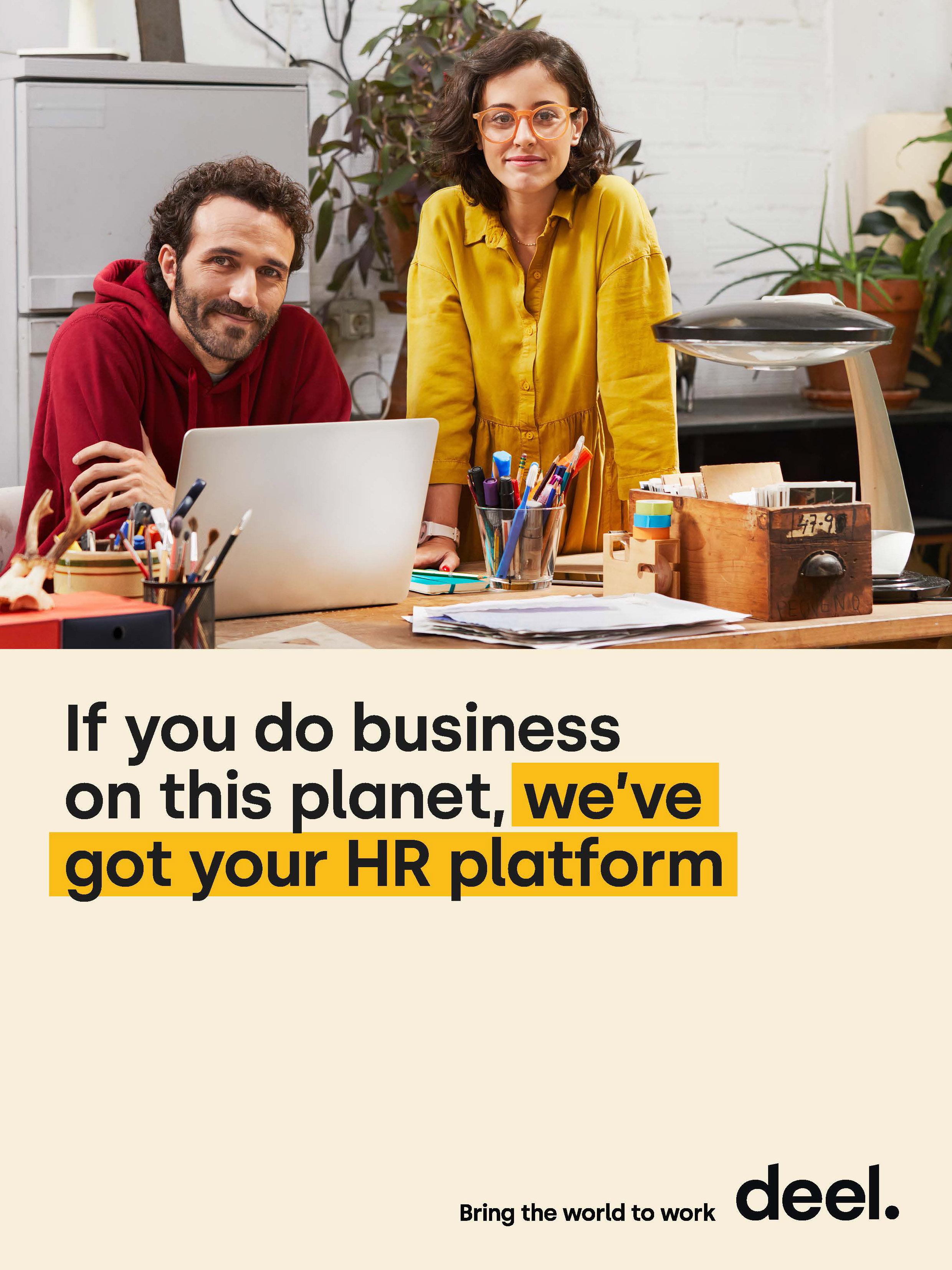
A HIGH-PERFORMING CULTURE EMPOWERS BIG DREAMS AT LENOVO
On her recent visit to Hong Kong, Jeanne Bauer-Hamlett, Executive Director, Human Resources – Solutions & Services Group (SSG) – Lenovo, took Tracy Chan through the company’s culture transformation journey.
aA strong company culture can attract and retain top talent, which in turn, helps build a strong organisation. This is easier said than done, but Lenovo is one company that has made its mark in this area.
Starting as a small technology company in Beijing in 1984, Lenovo has now developed into a Fortune Global 500 multinational technology company, serving customers across 180 markets.
In line with the company’s growth, Lenovo has made several pivotal acquisitions along its journey in order to expand its product portfolio and market presence, including IBM’s Personal Computing (PC) Division in 2005, and Motorola Mobility in 2014.
With all these new businesses being added in, integrating diverse cultures into Lenovo’s own corporate culture has been one of the determinant factors to its success.
“If you look back to 2007, that was one of the pivotal moments in Lenovo’s culture,” shares Jeanne Bauer-Hamlett (pictured, right), Executive Director, Human Resources – Solutions & Services Group (SSG) – Lenovo, who first joined the company then, right after the acquisition of IBM’s PC division.
“Lenovo was struggling at the beginning with its culture. Partly because it had the initial Lenovo legacy team in China. It had just acquired IBM’s PC division. At the time, Bill Amelio was our CEO – he had come from Dell and brought in a lot of global talent from Dell, as well as their Dell culture. The three [cultures] were very different.”
And Bauer-Hamlett gives all the credit to Lenovo’s chairman at the time, Chuanzhi Liu, who recognised that the company had cultural challenges – not only in how the organisation worked cohesively, but even across the leadership team.
Liu, therefore, came up with the four ‘Ps’, which have grown into five: “We PLAN before we pledge; we PERFORM as we promise; we PRIORITISE the company first; we PRACTICE improving every day; and we PIONEER new ideas.”
“The first year was a big culture push around operational excellence and performance. Do what you say and own what you do. That set the tone for all the other cultural things that came,” Bauer-Hamlett explains.
“The next year was continuous improvement. Look at what you did well, look at what you did poorly, and then fix the things that you need to, but keep the things that worked.”
She describes these as the “precursors” and “foundation” for Lenovo’s culture today, saying it was very important to have an anchor for all of the new businesses Lenovo acquired. After all, it is not possible to change culture overnight.
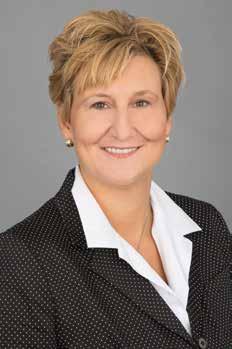
The company’s cultural values have since evolved and now focus on teamwork, respect, entrepreneurship, innovation, and performance. While these are the common denominators, each business unit can have its own different spin.
“At SSG, we love all of the cultural values, but we have to be strong in entrepreneurship, as we need that cultural value to accelerate our growth.”
» Human Resources Online Hong Kong » H1 2023 22 GLOBAL PERSPECTIVES » Jeanne Bauer-Hamlett
Building a culture where people want to stay and perform
Lenovo currently has three big business units – the Intelligent Device Group, Infrastructure Solutions Group, and Solutions & Services Group (SSG) – BauerHamlett supports the SSG.
“There is a side of the house with all the HR generalists and HR partners to support the business, and I am on that side. There are HR teams aligned with each of the business units. I give support to SSG’s leadership, management, and employees from my team,” she explains.
“There is also a geographic HR team, who we can reach out to for countryspecific situations. We have a very connected partnership on all sides.”
To Bauer-Hamlett, an effective HR partner has to really understand the business, not only its strategy, but what it is today and what it will be tomorrow.
“As I always tell Ken Wong, President of SSG, my job is to be three steps ahead of him, and I do get close,” she quips.
She believes a high-performing organisation needs a clear strategy, a culture where people want to stay and perform, and from an HR perspective, the HR platform to support employees.
The first thing is the leadership needs to have a strategic plan and be able to articulate what it takes to win and what that win looks like. That enables the whole organisation to build KPIs and other measures that keeps everybody aligned. The next thing is around culture.
“I personally don’t think you can have people working as hard as they can with their whole hearts to drive a business forward if you have a misalignment in your culture,” she says.
Then comes the right programmes and policies to support and protect employees, and drive an inclusive organisation. If people are having issues, for example, they can comfortably raise them through the HR platform. “As I always say, strategy, organisation, talent, culture, those are all the things that you need.”
Over the past few years, Lenovo has been open about wanting a diverse workforce. While everyone has to align with the same cultural values, it also recognises that the different perspectives, views, and experiences brought in by employees can make the company stronger, and this is also important on the product side to reflect the diversity among its customers.

Apart from the establishment of a Product Diversity Office on the product side, Lenovo has instituted specific employee resource groups for those with disabilities, veterans in the US, African Americans, Hispanics, Asian, youngsters, etc. It aims to create a culture that is inclusive to everyone, and give people an opportunity to be with others similar to them, and to look at Lenovo and recommend changes on how it can be better and more inclusive.
On the other hand, Lenovo also emphasises employee listening through an annual engagement survey called ‘Lenovo Listens’. “We ask our employees to tell us about their experience, what they think about the company, what they think we do well, where we can improve, and where their challenges are,” Bauer-Hamlett says.
“We have asked many cultural questions: are we taking care of you from a wellness perspective? Are we meeting your career development goals? Are we doing the things around compensation that make you happy? Do we have the right business processes and tools?”
This approach has been well received by employees – proved by its high survey participation rate globally at 92%-93%. “People participate in the survey because they know that leadership, senior leadership, and executive leadership, all the way up, take those results seriously and take action.”
To provide all-rounded support, the company has also launched benefits initiatives globally that address different aspects – physical, mental, and emotional. Take development programmes as an example, Bauer-Hamlett shares they have launched a lot of learning curricula that encourages employees to take up technical certifications.
“So, employees feel they are going to stay here for the long term because this is kind of the place where they want to work.”
She reveals the whole goal of building a culture that Lenovo can be proud of is to retain employees. “We know there will always be attrition, but my goal, at least for SSG, is to be the business unit that has the lowest attrition in the company, then I can say people want to work for our team.”
Finding the right cultural fit
Bauer-Hamlett shares that SSG, established in April 2021, has been in a huge growth mode, having hired almost 2,000 since 1 April 2022. It would have had the capacity to hire more had the talent market been more open. However, the talent shortage hit everybody which was tough.
“There is always pressure for managers to hire and get somebody on board to work and do things. We try to make a strong effort to step back and say: Look, if we are not finding the right person, let’s try with a different search agency, maybe move the job and put it someplace else, try different strategies, but at the end of the day, we will wait for the right person and it is hard,” she stresses.
This is because when managers have made hires that don’t fit well within their team, they have to take action and exit them, or the employee knows and exits. Then they have to start the
H1 2023 « Human Resources Online Hong Kong « 23 Jeanne Bauer-Hamlett GLOBAL PERSPECTIVES
Jeanne Bauer-Hamlett (second from left) and her team enjoy quality time out of the office.
process all over again, which doesn’t serve anybody well. And she indicates that the cost of rehiring and the cost of attrition is the ROI on retention.
To find the right talent, Lenovo has always been open and honest with prospective employees about its employee value proposition, which is tied to its cultural values. If they are aligned with the employee value proposition, they will be aligned with the culture.
For every open position, it also makes sure to have a good job description. The managers know what they are looking for in terms of hard skills, technical skills, and even HR technical skills. For soft skills and experiences, BauerHamlett says not only the hiring HR partner, but other HR partners and managers of specific businesses will be involved in the interview process.
“At the end of the day, managers are responsible for the culture of their team,” she says. “We are the caretakers of making sure that we hire an alignment with our culture.”
As a global company with diverse businesses, she admits Lenovo is a little bit of a challenging place to come in and understand. “We do a great job at a corporate level for a new hire orientation to introduce them to Lenovo,” she says.

But in the SSG world, as the business keeps evolving and developing, it can change from quarter to quarter – not significantly, but enough to impact the new hires. Therefore, Bauer-Hamlett is building an SSG-level new hire orientation to make sure there is somebody to answer the new hires’ questions and help them assimilate and ramp-up in the organisation a little bit faster.
“Our managers are very busy. We want to take some of the work off their backs. When their employees come in, they are oriented to where they are in SSG, how they are a part of the bigger Lenovo, and what resources are available to them, not just from an HR perspective, but other corporate opportunities. They are able to meet up with their manager and be productive a lot faster.”
She indicates that SSG as a division is still in start-up mode. Therefore, it is hiring very experienced people, and such talent may have different views than university hires, Millennials, or mid-career hires. “What we try to do is to make sure that we are offering something to everybody,” she says.
Adapting to changes
While the pandemic has accelerated change across the world, people at Lenovo have always understood that change is constant. But Lenovo doesn’t drive change for change’s sake, the team does so when it believes change can bring a positive impact on the business. It doesn’t do significant organisation structure changes lightly, but always looks to make adjustments and continuous improvements.
In fact, Bauer-Hamlett and the HR team support the organisation with change management, training and development, so people are comfortable with change.
“We even interview for this: Are you agile? Can you be adaptive? Are you comfortable working in ambiguity? Because at the end of the day, that is SSG and if you can’t work in that type of environment, you are not going to be a fit in our culture,” she adds.
Bauer-Hamlett recognises that there will be employees on board who may not agree with the change. “If an employee is unhappy or doesn’t want to make a change, we help them to facilitate that,” she says.
“It is not that the employee failed or that we failed, it is just that the organisation has changed and we may no longer fit, whether it is a culture fit, or a job fit, or an organisation fit, or how they want to work. We try to manage both sides.”
For any HR professionals who want to drive a cultural or organisational transformation, she reminds that the most important thing is “there shouldn’t be a rush”.
“Of course, you shouldn’t let it linger either, but where possible, take the time to really understand and then move forward,” she affirms.
Drawing on her experience, she highlights what to note for a transformation drive:
• Equip your HR partners so they are prepared for the change.
• Proceed very cautiously, understand what the culture is today, and understand how the changes may impact employees.
• Understand the strategy, and then figure out how to leverage the existing culture and where to make changes to some of those pieces that may no longer fit the organisation.
• Get out there and talk to the leaders and employees, be open to hearing what they say.
The other thing she stresses is to plan ahead. “Because you can always make a mistake with a programme, or have the wrong KPIs and company plans, you can always make changes to and fix those things. But you can do irreparable harm with a change to your culture.”
Looking beyond
In SSG’s evolution, Bauer-Hamlett says the first year was around organisational change and transformation. “The last year has been around looking at the organisation from a foundational perspective. Making sure we have the right job titles, consistent naming, better job descriptions, and very operational talent acquisition and compensation things to support the business,” she says.
For the coming year, she expects the focus to be on learning. “Understanding the skills that we have, the skills we are going to need in the future, deep diving into our key roles, and seeing if we are hiring the right people.”
While being good on the cultural aspect, she thinks that sometimes in transformation, it is important managers are not hiring for what an organisation used to need, but hiring for what it will need in the future.
“We will need to help managers understand what Lenovo and SSG really need to focus on, and raise the bar on all types of learning and orientation programmes – those are my big tasks,” she concludes.
» Human Resources Online Hong Kong » H1 2023 24 GLOBAL PERSPECTIVES » Jeanne Bauer-Hamlett
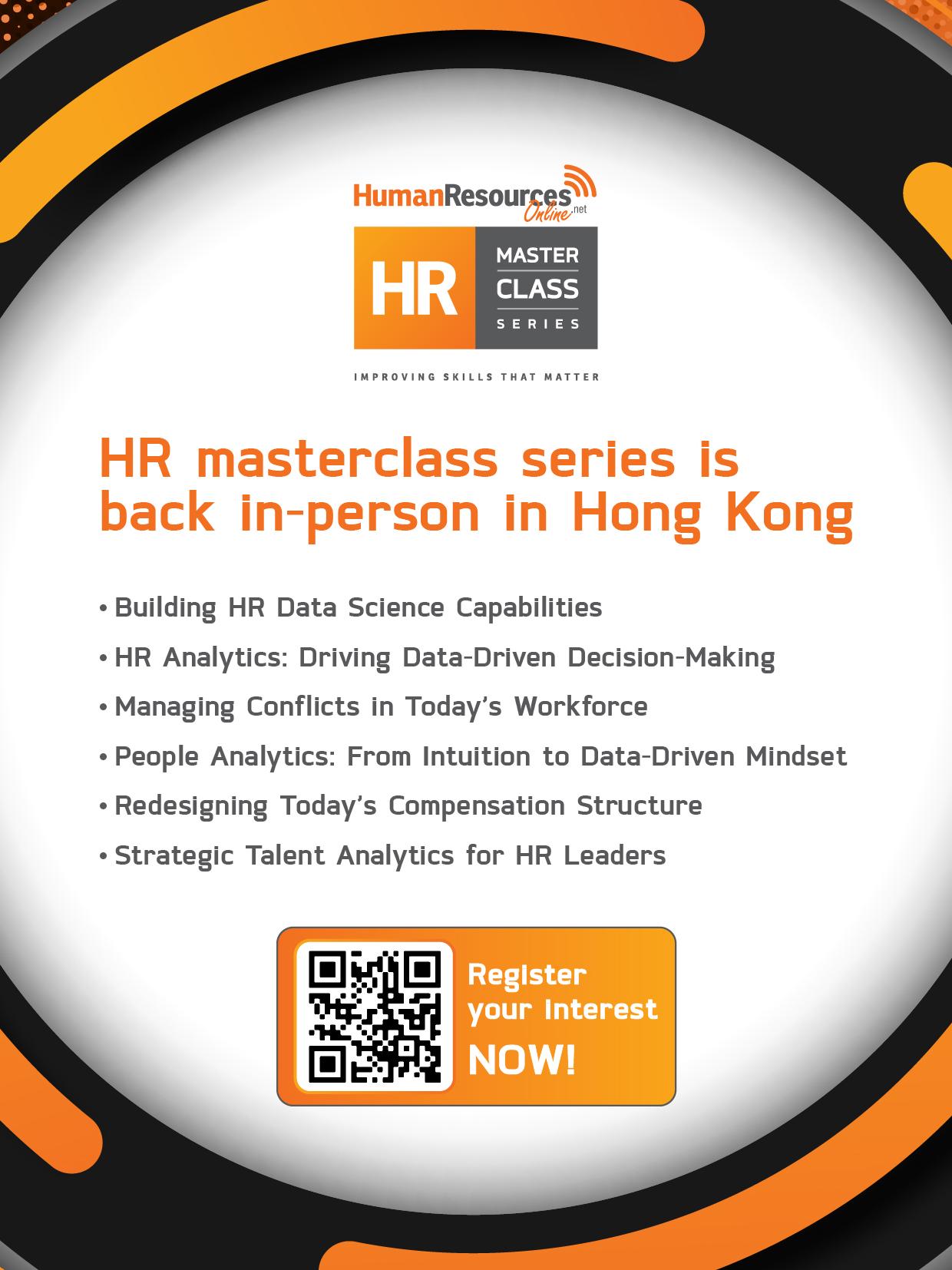
CELEBRATING THE COMPANIES THAT EXCELLED AT THE EMPLOYEE EXPERIENCE AWARDS 2023
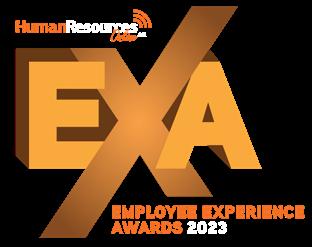
Judged by an esteemed panel of top HR leaders, the Employee Experience Awards 2023 recognised the HR heroes who successfully energised their workforce with a positive employee experience.
On the special evening of 29 June 2023, over 200 top-notch HR professionals in the city gathered at The Langham Hong Kong to celebrate and honour the finalists and winners of the Employee Experience Awards 2023, Hong Kong.



Creating a great employee experience (EX) is never easy. Therefore, it is crucial to recognise and reward the exceptional achievements of organisations that have put their employees at the forefront of their business strategies, even amidst all the challenges and disruptions over the past few years.
Through their remarkable efforts, winners and finalists across 21 categories not only showcased how they created comprehensive initiatives to support employees’ personal growth and companies’ organisational development, but also by elevating industry benchmarks by providing the best workplace experience with a more human touch.
Back for a bigger second edition, the awards expanded to include seven new categories: Best Employee Engagement Communication Strategy; Best Digital Learning Transformation; Best Virtual Learning Initiative; Best Employee-friendly Workplace; Best Engagement Programme; Best Response to Pandemic; and Best Talent Development Strategy.
Among all these EX experts, MGM China stood out with four gold awards in Best Diversity, Equity and Inclusion Strategy; Best Management Training Programme; Best Virtual Learning Initiative; and Best Learning and Development Programme.

It also won four silvers in Best Digital Learning Transformation; Best Talent Development Strategy; Best Career Development Programme; and Best Employer Branding. All these accolades contributed to it taking home the Employee Experience Awards’ Grand Winner prize.
Human Resources Online would like to extend our sincere gratitude to all our judges and attendees. Once again, heartfelt congratulations to all winners and finalists!
» Human Resources Online Hong Kong » H1 2023 26
PANEL OF JUDGES 2023
Pakson Lau
Associate Director – Talent, Learning & Development
CBRE Asia Pacific



Alice Wong
Human Resources Director, North Asia DFI Retail Group
Janet Yeung
Head of Human Resources
Business Partner Gammon Construction
Shawn Tan
SVP, People & Culture Hearts on Fire
Stan Choi Head of Human Resources Hex Trust
Chris Leung Assistant General Manager, Total Rewards, HR Policies & Systems Hongkong Land


Monica Chan Human Resources Director Jardine Aviation Services Group
Sara Ho Group Chief Human Resources Officer Jebsen Group
Mike Fong Director of Human Resources The Langham, Hong Kong
Fanny Lau Assistant General Manager –Human Resources & Head of Learning and Development New World Development Company
Kelvin Yu Chief Human Resources Officer PURE Group
David Lim
Senior Vice President Human Resources
PVH Asia Pacific
Priscilla Mui
Associate Director, Training and People Development Sa Sa International Holdings
Jimmy Chong
Human Resources Director Schneider Electric
Elaine Liu
Group Associate Director & Chief HR Officer Sino Group

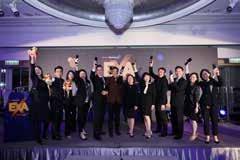
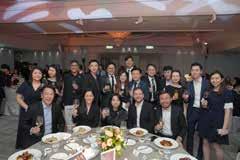
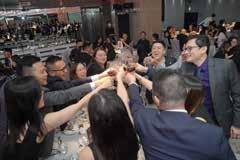
Kandy Mak
Head of Human Resources Zung Fu Company
H1 2023 « Human Resources Online Hong Kong « 27
BEST GRADUATE TRAINING PROGRAMME
GOLD
Cathay Pacific
SILVER Sands China
BRONZE
Marco Polo Hotels – Hong Kong
BEST HOLISTIC LEADERSHIP DEVELOPMENT STRATEGY



GOLD
DBS Bank (Hong Kong)

SILVER
Marco Polo Hotels – Hong Kong


BRONZE Under Armour

BEST EMPLOYEE ENGAGEMENT COMMUNICATION STRATEGY
GOLD
HK Express

SILVER Ergon Global
BEST CAREER DEVELOPMENT PROGRAMME
GOLD
DFS Group


BEST MANAGEMENT TRAINING PROGRAMME
GOLD
MGM China
SILVER MTR Corporation
BRONZE
Sands China
BEST DIVERSITY, EQUITY AND INCLUSION STRATEGY
GOLD
MGM China




SILVER Lenovo
BEST ESG STRATEGY
GOLD Sands China
BRONZE
Sands China
BRONZE
ESDlife

SILVER China International Capital Corporation


BEST DIGITAL LEARNING TRANSFORMATION

GOLD Fidelity International
BRONZE Chinachem Group

» Human Resources Online Hong Kong » H1 2023 28
SILVER MGM China
BRONZE The Hong Kong Jockey Club
SILVER MGM China
BRONZE Hongkong Land
BEST LEARNING AND DEVELOPMENT PROGRAMME
GOLD
MGM China
SILVER Sands China
BEST VIRTUAL LEARNING INITIATIVE
GOLD
MGM China
SILVER Fidelity International
BEST EMPLOYEE-FRIENDLY WORKPLACE
GOLD Assembly
SILVER
Pfizer Corporation Hong Kong
BEST ENGAGEMENT PROGRAMME
GOLD Jebsen Group
SILVER Sands China
BRONZE MTR Corporation
BEST ORGANISATIONAL UPSKILLING AND RESKILLING STRATEGY
GOLD
Sands China
SILVER OCBC Hong Kong
BEST EMPLOYEE WELLNESS STRATEGY
GOLD
DBS Bank (Hong Kong)


BRONZE Societe Generale
SILVER Under Armour

BEST TALENT DEVELOPMENT STRATEGY
GOLD DBS Bank (Hong Kong)
BRONZE MTR Corporation
BRONZE DBS Bank (Hong Kong)
BRONZE Chailease Holding Company


BEST FLEXIBLE WORKING STRATEGY
GOLD DFS Group






BRONZE Societe Generale
SILVER The Hoffman Agency Asia Pacific

BRONZE
American Express International

SILVER
MGM China



BRONZE
Marco Polo Hotels – Hong Kong
BRONZE ESDlife

H1 2023 « Human Resources Online Hong Kong « 29















» Human Resources Online Hong Kong » H1 2023 30 BEST HR DIGITAL TRANSFORMATION STRATEGY EMPLOYEE EXPERIENCE AWARDS GRAND WINNER
GOLD ESDlife SILVER Sands China SILVER MTR Corporation BRONZE Link Asset Management
RESPONSE TO PANDEMIC GOLD Jebsen Group SILVER OCBC Hong Kong BRONZE Fitch Group BEST REWARDS AND RECOGNITION PROGRAMME GOLD American Express International SILVER Hongkong Land BRONZE Sands China
WORK-LIFE HARMONY STRATEGY GOLD DBS Bank (Hong Kong) SILVER Pfizer Corporation Hong Kong BRONZE Sands China BEST EMPLOYER BRANDING GOLD HK Express SILVER MGM China BRONZE Sino Group GOLD Jebsen Group
MGM China
BEST
BEST
MGM CHINA EMPOWERS EMPLOYEES TO UNLEASH GREATNESS

to cultivate a diverse, barrier-free, harmonious and inclusive workplace to appreciate all the differences and provide equal opportunities to everyone. Currently, MGM houses employees of 24 different nationalities, with one disabled employee for every 232 employees.
As a leading developer, owner and operator in hospitality and tourism in the Greater China region, MGM China’s commitment to making every moment great extends beyond its guests, to its 11,000-strong workforce. In line with its brand values, MGM is striving to create a culture of greatness through people.
MGM’s HR strategies are guided by the three pillars of developing great people, building a great brand, and collectively creating a great organisation. Let’s find out how this industry leader of gaming and lodging resorts in the Greater China region brings its vision to life and puts great people together to bring artistry and entertainment to life.
Nurturing and developing great people
To support the long-term success of individuals and the company, learning never stops at MGM, where employees are encouraged to embrace continuous learning as a way of life. This, therefore, has led to the establishment of MGM Academy and eAcademy as its corporate university to drive learning and growth for employees.
Bearing the credo of “Discover a Greater YOU”, MGM Academy provides a wide range of learning resources. These include over 2,400 academy and departmental classroom courses, 10 career development programmes for high potential employees across all levels, as well as subsidies or sponsorship to support employees to further pursue their educational goals.
To cater to the needs of different groups of learners amidst highintensity operations, MGM has also developed a comprehensive online learning management system named ‘MGM eAcademy’. Comprising inhouse e-learning materials and external resources from renowned learning institutions, eAcademy provides over 15,800 digital courses, allowing employees to learn anytime, anywhere through any mobile device.
To further encourage and inspire employees, MGM has also organised different signature learning events and initiatives such as the ‘MGM Graduation Ceremony’, as well as an array of professional seminars in partnership with local and overseas experts targeting MGM employees, students, and industry professionals.
Creating a great workplace for everyone
With a strong belief that “Everyone has Greatness within them”, regardless of race, gender, age, culture, and physical capabilities, MGM is also striving

MGM believes greatness is best unleashed when team members are well looked after and engaged. Therefore, the people strategy commits to providing extensive facilities covering different aspects of employees’ daily life, ensuring healthy work-life balance, cohesiveness, morale and, more importantly, a sense of belonging among team members. These facilities include an employee health centre, quiet zone, mother zone, employee library, 24/7 staff canteen with both Chinese and Western dishes, and an employee shuttle bus.
Work safety is closely related to wellbeing. As such, MGM integrated both by organising a “Work Safety and Wellbeing Campaign” in 2022, featuring thematic roadshows, competitions, seminars and workshops, to raise employees’ awareness.
Making great contributions to the community
Apart from taking care of employees, MGM also upholds corporate responsibility by working collectively with its employees to contribute to the community and serve different social groups, particularly senior citizens, the youth, the disabled, and underprivileged families, through arts, education and promotion activities. Supporting sustainability is another community effort made by MGM. MGM integrates modern concepts of environmental sustainability into its daily operations, such as the implementation of decarbonisation projects in 2022 to save over 1,644,900 kWh of electricity; achieving a 12% utilisation ratio of recycling unconventional water, reducing 32,600 tons of CO2 emissions, and fertilising over 100,000 plants at its properties from food composter, realising its sustainability vision of “Creating a Better Tomorrow Today”.
Looking ahead, Wendy Yu, Executive Vice President of Human Resources, MGM, expresses the company will consistently strive to be the best employer with the best HR practices.
“We hope experiences of the past can better prepare us with future-oriented skill sets, an innovative mindset, and the spirit of craftsmanship,” she shares. “By identifying and confronting unprecedented humanitarian challenges such as a health crisis, a massive shift in economic factors, and advanced development of AI, we have testified to and manifested the extraordinariness of HR, witnessing the power of ourselves.
“For the future, we will continue to take a leadership role and provide service in fostering a committed, engaged workforce, driving organisational growth, and making a better tomorrow today for our community.”
H1 2023 « Human Resources Online Hong Kong « 31 THIS ARTICLE IS BROUGHT TO YOU BY
MGM CHINA
MGM’s people philosophy is the creation of a great workplace that inspires talent to flourish and to “Make Great Moments” for staff and communities.
Leave behind your ‘imposter syndrome’ feeling … and be fearless
Exclusive to HRO’s Tracy Chan, Diana Avila, Global Head of Banking and Expansion at Wise, shares her experience, vision, and advice for women looking to develop their careers in the fintech industry.
Having moved from Colombia to London, what drove Diana Avila, Global Head of Banking and Expansion at Wise, to jump from the legal world to the financial industry was the desire to solve problems.
“I was working as a lawyer for four years in Colombia. My role was more about advising financial companies that were looking to enter the Colombian market,” Avila recalls.
“I felt like I was so many layers removed from having a direct impact on building things.”
During her time studying for a master’s degree in London eight years ago, she came across Wise when she was facing difficulties in sending money back to Colombia to pay for a student loan. What resonated with her was the mission of the fintech company – money without borders; to make money movement across borders easier, cheaper, more transparent, and faster as it would do locally.
“My key motivation was being closer and first-hand to this problem, seeing how companies like Wise were innovating and bringing better products
to customers, and building those solutions for customers as opposed to being more in an advisory role in the background.”
As a woman working in a traditionally maledominated industry, Avila admits sometimes the barriers are internal.
“I tend to be the only woman in the room in several situations,” she says frankly. “That can be challenging because it takes a few seconds to find your voice and build up confidence.” But this doesn’t mean women cannot speak as loud as, or even louder, than men.
Speaking exclusively to HRO ’s Tracy Chan, Avila shares her vision of empowering women at Wise and her advice to other women who are looking to develop their careers in the financial or fintech industry.
32 BREAKING BARRIERS » Diana Avila » Human Resources Hong Kong » H1 2023
Q Having grown up and studied in Colombia and now having moved to London, what is the difference between working/living in both countries? How has your early life in Colombia influenced your work approach at Wise?

My experience working as a lawyer in Colombia was 100% focused on the Colombian regulatory environment. It was very centred around one jurisdiction, one set of rules, and one regulator.
At Wise, the biggest difference is the global exposure of my role and the company – understanding the regulatory environment of 20 or more countries, building experience and drawing comparisons of what we have seen in different countries, and constantly learning and leveraging that knowledge to approach a new country.
I don’t know if it is specifically because of having grown up in Colombia, as we tend to be quite approachable and warm and able to build relationships, or how much is actually driven by the example of my mother – she is the most amazing and fearless woman that I have known. I think one key aspect is the ability to talk to literally anyone, not be afraid of nor shy about it, and be able to build truthful and impactful connections.
Sometimes, when you are building a team, talking to the CEO, or talking to external regulators or banks, if you are able to build these meaningful connections, to explain our mission, and why we are solving this problem, you will be able to bring them on board and drive these changes.
Q The financial industry is traditionally male dominated, what challenges and barriers have you faced and how do you tackle those challenges?
Part of my role is meeting with banks and regulators around the world to explain what Wise does and understand what they want to see from us to continue expanding our product offering in new markets.
One of the challenges that I faced at the beginning, and am still facing plenty of times, is I tend to be the only woman in the room in several situations. That can be challenging because it takes a few seconds to find your voice and build up confidence.
With years, the time to build confidence has been shortening quite significantly, and now it has become more natural as I acknowledge that though the situation is still very male-dominated, it doesn’t mean that my voice is not as loud as, or even louder than theirs, because I am here to solve a problem for our customers.
We are so clear on the mission. We bring purpose to these conversations and make them relatable, and then there is no fear or imposter syndrome around being the only woman and trying to drive these convictions.
Q What is the most impactful campaign or initiative Wise has put in place to create a more diverse workplace?
At Wise, we now have 5,000 people in total with 49% being female – pretty much a 50:50 split. Specifically for male-dominated roles like on the product side, we have been increasing the female proportion for years and today, more than 40% of our product managers are female.
We are very proud to see the diverse split that we already have at Wise – not only in terms of women and men in the workforce, but also the country of origin – we have 117 nationalities of people spread across Wise’s offices all over the world. We are building a product that has to be diverse to solve problems in many different countries, and we have to talk to banks and regulators around the world. It is interesting how we can drive it internally from a diverse team.
One of the initiatives that we have at Wise is what we call the ‘WiseWomenCode’. We support training for women at the early stage to develop their skills as software developers. We have also implemented a programme in London and Tallinn where we get women and non-binary people who are just getting started to enter the industry to join Wise for a week to learn what it is like to work in the company and to work with tech teams to deliver part of the product. What they can get is not only experience in technical work, but also to be exposed to working with others in a team to build up their confidence.
Another initiative that I have been driving for a couple of years is the ‘Wise Women in Social’. One thing that I have learned, and maybe referring to these aspects of sometimes being the only woman in the room, is that it is so important for us to build strong bonds among women and to support each other.
33 Diana Avila « BREAKING BARRIERS H1 2023 « Human Resources Hong Kong «
We need to have a safe space to talk about our areas of development and what we are struggling with, and ultimately, be able to network with other women. We try to do these relaxing social events at least once a quarter. We invite external speakers and do a Q&A most of the time, and then we network among women, providing a space for women to share their experiences.
Q As a female leader, what changes would you like to bring into the financial industry?
The first aspect is specifically the product itself. The key change that I want to bring to the financial industry is to make finance fairer, and more transparent for everyone through new products and innovation. Today, people and businesses move an estimated £11tn across borders and lose about £180bn annually due to hidden fees. At Wise, we are saving customers £1.5bn each year in fees, so there’s still a long way to go to solve this massive problem.
The second aspect is more on the culture – how can we build diverse teams, as well as drive a more inclusive culture at work. I would, of course, love to incentivise more women to join the financial industry. For me, I not only joined it, but continue being empowered to make decisions to drive change.
We have different technical education programmes for women. As an engineering and product-led organisation, we have seen how these teams tend to be more male dominated. That is why we are investing and putting our efforts to help and support more women to get trained as engineers, and also opening up some ways in which they can experience working at Wise, try building products, and making decisions to continuously motivate them to join the fintech industry.
Q Looking forward, what kinds of talent and skills are most needed for Wise’s international expansion?
The problem we are after is how people deal with finances internationally. That means we have to be present all over the world, not only in one or two countries. As such, we need the ability to identify and understand the local particularities of each market, including the different regulatory requirements, how different payment systems work, how we can build a product on top of these, and how we can bring these as part of the products that we are building at Wise.
Secondly, from a skill perspective, we expect and incentivise people to be very autonomous and absolutely empowered. I truly believe that the people closest to the problem are in the best place to make decisions and drive change.
More traditional companies tend to be more top-down driven where a big boss or a few committees are deciding very specifically what needs to be done in every country or every division of the company. In Wise’s case, we have a culture that empowers people to make decisions.
Q Any advice to share with other women who are looking to develop their careers in the financial or fintech industry?
The first one, which has been very helpful in my case, is finding a company and a product that you truly relate to and believe in. That is what has kept me motivated for so many years and makes me really proud of what we have achieved so far at Wise.
Secondly, as women, sometimes we could hold back or fall into (the) imposter syndrome. We are not sure if it is OK to say what is in our minds at a certain point. Leave those fears behind and be fearless! That takes work and sometimes it doesn’t come naturally. I think it is important to clearly define and develop those goals and be intentional about them.
The third tip is to always continue learning and developing skills. Specifically, in the fintech industry, things move very quickly. In the case of Wise, there were instances where I have learnt about this particular product and spent many months understanding the regulatory environment in country A, but two weeks or even two months later, we are already thinking of another product or trying to expand to country B.
You need to have the ability to switch. Keep your mind open as if every day is the first day. Be open to continue learning and challenging yourself.
Q Any big plans at Wise or personal plans in the next couple of years?
At Wise, we plan to continue to focus on our mission, and continue our expansion in the APAC region particularly. I personally am very excited. From a team-building perspective, we will continue engaging with more people who are willing to come to tech and join forces to drive the mission of Wise. For example, in Singapore, we now have 400 people and we will continue growing our team by inviting more female engineers to join us. A more diverse team brings better products which we will be able to deliver to customers.
34 BREAKING BARRIERS » Diana Avila » Human Resources Hong Kong » H1 2023
HK EXPRESS TAKES PEOPLE ENGAGEMENT TO NEW HEIGHTS


Seeing employee engagement as a co-created journey, what the airline offers is more than just a job but an exploration of different possibilities.
young and aspiring talents can acquire hands-on experiences as well as work-based skills and knowledge through crossfunctional projects and training.
“As an employer and recruiter myself, I see my job offering opportunities and meeting expectations for anyone who wants to explore future opportunities with HK Express,” Vivian So, HK Express People Director, shares. “Those who want to embark on a journey with HK Express will surely find it’s more than just a job. This is a journey we build together. You never know where the opportunities will take you.”
“Collaborative, entrepreneurial, efficient, reliable, vibrant are the core values that inspire our people, and drive the vision of HK Express to become the leading best practice low-cost carrier (LCC) in Asia.”
This statement may well explain the self-positioning of HK Express, a wholly-owned subsidiary of the Cathay Pacific Group.
Having challenged convention by bringing Hong Kong its low-cost carrier in 2013, HK Express aims high to have the best practices in Asia by offering affordable and reliable air travel to destinations across the region. And such a pursuit of excellence and pioneering spirit has been fuelling its employer brand and people practices.
Taking ‘simplicity’, ‘agility’ and ‘efficiency’ to its core, HK Express strives to build an entrepreneurial, cohesive and empowered organisation, and thus, become an employer of choice and a great place to work. To achieve this, it starts by telling a strong employer brand story that resonates with current and potential talents.
A dedicated People & Culture team was formed to promote the HK Express employer brand across different platforms such as LinkedIn and career fairs. Different from the usual practice, the team made a bold decision to leverage exclusive storytelling techniques, addressing all audiences in a more narrative and first-person tone in all content to create an experience of “as if we were together”.
Another unique approach the airline takes is to portray its people as inspirational employer branding champions. Leading by the example of the CEO and the leadership team, such dedication has further reinforced the persuasiveness of HK Express’ employer stories and driven a ripple effect throughout the organisation.
Complimenting the brand storytelling was the launch of a talent attraction campaign which effectively achieved a call-to-action purpose to invite talents to join HK Express for an unforgettable career adventure.
Further, to offer opportunities for people looking for different purposes in their lives, the airline has introduced the first-ever ‘AXIS Internship’ and ‘HORIZON Graduate Trainee’ programmes. Throughout these programmes,
HK Express’ employee journey continues with other engagement initiatives. To sail through the new normal of a hybrid work environment, HK Express puts a strong focus on transparent and effective communication to keep people engaged. For that, the airline transformed to a brand new one-stop employee communication platform ‘UOnline’ that contains all information and resources to keep employees timely informed and engaged anytime anywhere.
To further boost employees’ spirit, HK Express launched a unique ‘UO THANKSMAS’ programme on Thanksgiving till Christmas last year to recognise employees’ continuous contributions and engage teammates to give back to the community. The airline has also created the first-ever ‘UO Advent Calendar’, unboxing everyday surprises such as ‘UO Kudos Awards’, ‘Book Santa Drive’, special day-offs and treats, etc. to fill people with joy.

“What’s always on the top of our mind is to create meaningful and purposeful work for our people,” Vivian continues. “Instead of seeing employee engagement as a programme, we see it as an interchange of different experiences, paths, and journeys co-created by our people that shape up the culture and engagement at HK Express. It has been a fruitful collection of exciting, happy, and challenging moments, and the bond grows stronger as we come together to look for solutions and learn from each other.”
As the aviation industry bounces back, HK Express is not looking to go back to “normal” but instead to stay agile and open-minded to create better experiences to meet new expectations, bring the most value out of overcoming challenges, and sustainably build a new meaning of jobs.
“What so interesting and exciting about our role of HR at HK Express is that we never know what will happen tomorrow, but we respond and adapt to new needs each and every day,” Vivian says. “Because at HK Express, we believe in all possibilities and potentials, we co-create the actual job description together as we dance along, and we bring meaningful career journeys by flying higher and even further together with our people.”
H1 2023 « Human Resources Online Hong Kong « 35 THIS ARTICLE IS BROUGHT TO YOU BY HK EXPRESS
A COMPARISON OF EMPLOYMENT LAWS BETWEEN HONG KONG AND MALAYSIA
It is undeniable that Hong Kong had one of the toughest travel restriction policies in the world over the past two years due to the COVID-19 pandemic. Now that the borders have reopened and quarantining is no longer mandatory, there is a steady increase in the trend for local Hong Kong companies looking to establish their presence overseas, particularly in Southeast Asia, and more specifically Malaysia, be it the incorporation of a local subsidiary, representative office, or branch.
The logistics of doing so can be daunting especially since the entities will be located in different jurisdictions, which means the laws and regulations vary, and consequently, matters pertaining to employment are often overlooked.
Whilst both former British colonies have adopted a common law system, the nitty-gritty on the procedure of governing actions is non-identical. To make matters more perplexing, Malaysia, over a year ago, passed the Employment (Amendment) Bill 2021 with a view to improve protection offered to employees in Malaysia, thereby enacting the Employment (Amendment) Act 2022 (“EA Amendment”) which came into effect on 1 January 2023.
Foreign businesses entering Malaysia may well be confused with the current and upcoming regulations around employment matters, and this article is written with a hope to bring clarity on this matter.
When does the Employment Law apply in Malaysia?
In the absence of a contract of service between an employee and an employer, the rights and prerogative of each employee and employer shall be governed
and prescribed under the purview of the relevant employment law, i.e., Employment Act 1955 (“EA 1955”) and its amendments thereof.
This does not necessarily mean that the employer could provide less favourable terms to its employee in the contract of service, as any term which is viewed as less favourable to an employee than a term prescribed by EA 1955 would be considered as void and of no effect (Section 7 of the EA 1955).
Despite that, any entitlement in excess of what has been prescribed by the relevant employment laws is fortunately valid as the government authorities adopt a laissez-faire attitude allowing the employer to do as it sees fit.
Employees under the Purview of the EA 1955
The Employment Ordinance (Cap. 57) (“EO”) applies to most employees in Hong Kong with several exceptions, whilst the EA 1955 originally only covers employees that are gainfully employed in Peninsular Malaysia (employees from all other states such as Sabah and Sarawak shall follow their
» Human Resources Online Hong Kong » H1 2023 36 EMPLOYMENT LAW » Hiring across borders
Kate Loo, Legal Manager, JC Corporate Malaysia, brings clarity to the rights and prerogatives of employers and employees in the two Asian markets.
own legislations, i.e. Sabah Labour Ordinance or Sarawak Labour Ordinance which are substantially similar to EA 1955) who receive monthly salaries of RM2,000 and below (as well as other specified categories of workers). This denotes employees with salaries above RM2,000 per month are unable to rely on the statutory law and can only resort to the terms and conditions set out in their employment contracts.
Providentially, this has recently been revised with the implementation of the Employment (Amendment of First Schedule) Order 2022 on 1 September 2022 whereby the EA 1955 is now applicable to all employees irrespective of wages by virtue of the recent amendment to its expansion of the definition of ‘employee’. However, those earning above RM4,000 per month shall be exempted from certain provisions in the EA 1955, including:
• Section 60(3) – Overtime rates for employees working on rest days.
• Section 60A(3) – Overtime rates for work outside of normal working hours.
• Section 60C(2A) – Shift work allowance.
• Section 60D(3) – Overtime and allowance for work on public holidays.
• Section 60D(4) – Overtime for work on holidays on half working days.
• Section 60J – Termination, lay-off, and retirement benefits.
Maternity leave
In Hong Kong, under Section 12 of the EO, a female employee who is employed under a continuous contract of not less than 40 weeks (approximately nine months) immediately before commencement of maternity leave, having given notice to her employer of her pregnancy, is entitled to a continuous period of 14 weeks (approximately 98 days) paid maternity leave or as specified by the terms and conditions of the employer, whichever is more favourable.
Conversely in Malaysia, pursuant to Section 37 of the EA 1955, only a female employee who is employed under a continuous contract of not less than 90 days over the nine months from her confinement period and employed by her existing employer within the four months leading up to the confinement period, is entitled to a continuous period of 60 days paid maternity leave. This shall change upon the enforcement of the EA Amendment by which the entitled maternity leave shall no longer be 60 days but 98 days in Malaysia.
Although the employment laws in Malaysia are late to change, it should be highlighted that even before the EA 1955 was amended to be made applicable to all employees, the overall maternity protection provided under EA 1955 was generous to be made available to every female employee regardless of her wages (Section 44A of the EA 1955).
Paternity leave
A breakthrough moment for employment law in Malaysia happened with the new Section 60FA of the EA 1955 following the implementation of the EA Amendment, whereby fathers are entitled to seven days of consecutive paid paternity leave subject to being married to the mother in question, being employed by the same employer for at least 12 months, and having had notified the employer at least 30 days from the expected confinement.
This is not always the case as unlike the EO in Hong Kong, EA 1955 does not confer any paternity leave to fathers of new-born/s in Malaysia. The EO on the other hand entitles a male employee in Hong Kong who has been continuously employed for a period of not less than 40 weeks (approximately nine months) immediately before the date of commencement of his paternity leave a period of not less than five days of paid paternity leave or as specified by the terms of the employer, whichever is more favourable.
Termination provisions
The employment laws in Malaysia are oftentimes portrayed as being more favourable to the employees as opposed to Hong Kong, where the general consensus is that the EO works in the best interest of the employers. This, however, may not be completely true as when EA 1955 is set side by side with the EO, EA 1955 simply requires additional steps in dismissing an employee.
For instance, to dismiss an employee in Malaysia without any legal repercussions on the side of the employer, the employer is required to provide a justified reason as to why he or she is dismissed. The reason given by the employer must be of ‘just cause and excuse’, meaning the employer must provide a valid reason, otherwise the employee may lodge an unfair dismissal claim at the Industrial Court (Section 20(1) of the Industrial Relations Act 1967 (“IRA 1967”) through which the said employee may be entitled to termination benefits and awards which include reinstatement to his/her position, back wages, or both.
In the case of Ireka Construction Berhad v Chantiravathan Subramaniam James [1995] 2 ILR 11 (Award No. 245 of 1995), the Industrial Court held that:
“It is a basic principle of industrial jurisprudence that in a dismissal case the employer must produce convincing evidence that the workman committed the offence or offences the workman is alleged to have committed for which he has been dismissed. The burden of proof lies on the employer to prove that he has just cause and excuse for taking the decision to impose the disciplinary measure of dismissal upon the employee. The just cause must be, either a misconduct, negligence or poor performance based on the facts of the case.”
This adds additional burden to the employer since the onus is on the employer to prove, on balance of probabilities, ‘just cause and excuse’ at the Industrial Court as opposed to the ex-employee proving that he or she had been dismissed unfairly, noting that the said employee will be the one initiating the claim to the Industrial Court.
‘Just cause and excuse’ itself is not defined in the statute, thus, any valid reasons for dismissal including gross misconduct, negligence, and poor performance on the part of the employee, or redundancy shall suffice, and what exactly constitutes ‘just cause and excuse’ is also dependent on the circumstances of each case.
Aside from special reasons, i.e., gross misconduct, any termination of employee by
H1 2023 « Human Resources Online Hong Kong « 37 Hiring across borders EMPLOYMENT LAW
the employer must be done in a procedurally fair manner by providing the employee sufficient notice as prescribed by Section 12(2) of the EA 1955. An employee may be dismissed by an employer without due notice in the event of misconduct, but the employer is required to conduct an inquiry before dismissing the employee on the grounds of misconduct. Although it is not fatal to disregard the conduct of a domestic inquiry when dismissing an employee with notice upon providing ‘just cause and excuse’, it is always advisable to err on the side of fairness.
Flexible working arrangements
Prior to COVID-19, remote and hybrid working arrangements had not been prevalent in Asia. Now, the Hong Kong government encourages employers to implement flexible working arrangements for employees. The new EA Amendment in Malaysia also provides for flexible working arrangements. This is crucial for the post-pandemic business landscape, with modern work models now becoming more common.
Following the new Section 60P and 60Q of the EA 1955, employees may apply in writing for flexible work arrangements from employers where employers will be given 60 days to respond with a decision, and in cases of rejection, reasons must be given to employees.
Annual leave
In Hong Kong, employees employed under a continuous contract are entitled to a minimum of between seven days and 14 days of annual leave (depending on the length of continuous employment) for each period of 12 months’ employment.
In contrast, employees in Malaysia are entitled to paid annual leave which, like Hong Kong, is also dependent on the length of continuous employment, but ranges from a minimum of between eight days and 16 days.
Also in Malaysia, ‘probation’ is not defined in the EA 1955, thus a probationer enjoys the same rights as a permanent or confirmed employee such as annual leave, holidays, minimum wage etc. as prescribed under the relevant employment laws or the contract of service, as well as the right to lodge an unfair dismissal claim with the Industrial Court pursuant to the IRA 1967.
Minimum wage
The Minimum Wage Ordinance (Cap. 608) provides that the statutory minimum wage in Hong Kong shall be HKD40 per hour, whereas the minimum wage stated in Malaysia’s Minimum Wages Order 2022 effective 1 January 2023 will be RM1,500 per month and RM7.21 per hour.
Statutory contributions
Similar to Hong Kong, Malaysia’s employers and employees are subject to an equivalent of the Mandatory Provident Fund (MPF), namely the Employees Provident Fund (EPF), whereby employers are required to contribute at least 12-13% of the employees’ salaries to their EPF savings. This differs from Hong Kong as employers in Hong Kong are required to contribute at least 5% of the employees’ salaries into their respective MPF savings.
Notable Amendments to EA 1955 Working hours
The working hours will also be revised by reducing from a maximum weekly working hours of 48 hours per week to 45 hours per week.
Foreign workers
Aside from what has been discussed above, one of the prominent changes which employers in Malaysia will have to note is the amendment made to Section 60K of the EA 1955, which covers the employment of foreign workers. Previously, employers who hire foreign employees were merely required to inform the relevant authorities of new foreign employees along with details within 14 days of employment. With the EA Amendment, employers are now required to obtain prior approval in order to hire foreign employees.
Other matters to ponder in Malaysia
Foreign businesses looking to branch out into the Malaysian market shall also take into consideration other laws and regulations, namely:
• Minimum Retirement Age Act 2012
• Immigration Act 1959/63
• Employees Provident Fund Act 1991
• Employment Insurance System Act 2017
• Employees’ Social Security Act 1969
• Income Tax Act 1967
• Pembangunan Sumber Manusia Berhad Act 2001
• Trade Unions Act 1959
• Employment (Termination and Lay-Off Benefits) Regulations 1980
• Employment (Part-time Employees) Regulations 2010, applicable to any parttime employees they intend to employ.
Conclusion
In essence, generally, the employment laws in Malaysia and Hong Kong do not have a substantial discrepancy. Malaysia’s employment laws may be illustrated to be more well-balanced in the eyes of the employees and require scrutiny when it comes to terminating an employee from the perspective of the employers. Nevertheless, foreign employers in Malaysia are advised to be prudent in ensuring compliance with the EA 1955 and the recent amendments.
» Human Resources Online Hong Kong » H1 2023 38 EMPLOYMENT LAW » Hiring across borders
DEVELOPING WITH HEART: CHINACHEM GROUP’S 3PS APPROACH FOSTERS AN ENGAGED WORKFORCE
Having positioned itself as a company with heart, Chinachem Group also places employees’ happiness and wellbeing among its top priorities and recognises the importance of their social, physical and mental wellness. In addition to hybrid work arrangements, enhanced benefits and family-friendly initiatives, the Group also funds employee-led social clubs that foster communities, and encourages staff to champion activities to promote a culture of wellness.
“Overall, we promote open communications, teamwork collaboration, and de-emphasis on hierarchical structures to create a safe, positive and supportive work environment that values the wellness of our staff members,” Hung affirms.
The 3Ps value is the inherent sustainable DNA in Chinachem Group. To drive the sustainable development of both the Group and staff members, HR provides different learning opportunities to bring out the best in their colleagues and nurture future leaders. For example, in the financial year 2021/22, the Group provided more than 31,000 training hours to employees. At the end of 2022, they launched the first annual ‘Management Associate Programme’, a structured career development training scheme targeting young graduates.
Chinachem Group (the Group) is more than a property developer. Based in Hong Kong, the industry leader is committed to making a better place for people to live, work, and raise their next generations. Driven by its purpose, the Group has embraced its 3Ps principle of balancing People, Prosperity, and Planet in its business practices, aiming to create “Places with Heart” to bring sustainable value to its stakeholders, including staff members, tenants, customers, and communities.

Chinachem Group sees their colleagues as a key pillar of their long-term success. With a team of over 3,000 members, the Group strives to bring together capable and like-minded talents to build a diverse workforce in an inclusive workplace that empowers staff members to unleash their potentials and bring positive impact on the company and community, which in turn, delivers fulfilling experiences as well as promising careers and lives.
“Chinachem Group is a company with purpose and our 3Ps approach guides our growth,” Lawrence Hung, Director of Human Resources of Chinachem Group, affirms. “We offer equal opportunities for our colleagues to excel, as well as fulfil and unleash their potentials.”
The people-centric approach is evident in the Group’s recent workplace transformation project. By involving a range of stakeholders, including staff members, management, and external consultants, the project team gathered feedback through surveys and focus groups to understand what employees value most in their work environment. Throughout the process, Chinachem Group emphasised seamless communication and transparency, ensuring all colleagues were informed about the project and had opportunities to provide feedback and input.
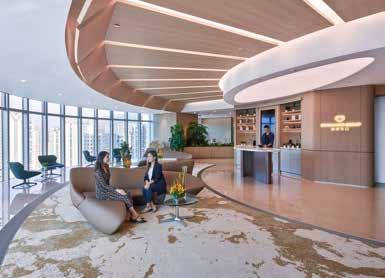
In fact, by fostering two-way communications, ongoing feedback, and transparent management, all staff members, regardless of their gender or levels of seniority, can be part of the decision-making processes, share their ideas and perspectives, and hold themselves accountable for results.
In addition, all new hires undergo compulsory e-learning on ESG, to build their capacities around the Group’s core values and equip them with the know-how of ESG in their daily routines. Other learning and development initiatives include ‘Places with Heart Academy’, ‘ESG Talks’, ‘S-clinic’, and training subsidies.
To align everyone with the sustainability mission, the Group has also created a new ESG governance structure and formed a dedicated ESG department with support from top management. Led by the Director of Human Resources, the ESG Sub-Committee – People comprises industry veterans who bring forward their expertise, monitor progress, and ultimately deliver change to meet the corporate goals.
As the roles of HR evolve, Hung believes one thing HR should start doing more is to continue enhancing employee experience and engagement. To do so, most HR tasks and workflow have been digitalised and streamlined, such as Document Management System (DMS), cloud-based talent management, human capital management system (SAP), HR data analytics, and more.
By embracing new technologies and innovative approaches, HR can focus on talent management to empower staff, create more effective and efficient processes that better meet the needs of their colleagues and the organisation as a whole, and build a corporate culture that supports the Group’s 3Ps value, and fosters engagement and productivity among employees.
“HR should focus on becoming a more caring team and playing a critical role in creating a positive and happy work environment that attracts and retains talent,” Hung reiterates. “By focusing on initiatives that promote employee engagement, such as continuous feedback and timely recognition, we can create a workplace where our staff members feel motivated, valued, and fulfilled.”
H1 2023 « Human Resources Online Hong Kong « 39 THIS ARTICLE IS BROUGHT TO YOU BY CHINACHEM GROUP
Aligning People, Prosperity, and Planet across operations, the Group empowers staff members to fuel the sustainable future of the company and the community.
TURN CHALLENGES INTO YOUR FUEL: FIVE PIECES OF CAREER ADVICE FROM BUMBLE’S CEO

From experiencing toxic harassment to becoming the youngest woman CEO to take her company public as of February 2021, Whitney Wolfe Herd, Founder and CEO of Bumble, shares her career advice with Arina Sofiah
Having experienced toxic behaviour on the internet, Whitney Wolfe Herd, Founder and CEO of Bumble, established the online dating platform in 2014 as a way to empower women, putting them in control of the interactions by making the first move.
Starting off with humble beginnings – no office, with four people working out of a twobedroom apartment – she has since become the youngest woman CEO to take her company public as of February 2021. Not only has she since been named in TIME magazine ’s ‘100 Most Influential People’ and Forbes ’ ‘30 Under 30’ list, she was also instrumental in helping pass a cyberflashing law in Texas in 2019 that makes sending unsolicited nude images a punishable offence.
With Bumble as a business aiming to level the playing field for women, it is no surprise that this principle is practised within as well. As a whole, 73% of the Bumble board comprises women, and the company has supported a campaign in the UK to criminalise cyberflashing alongside women’s advocacy groups since 2021.
In making these strides, Herd shares five key takeaways she has picked up.
Turn your own challenges into your fuel
Early in my career, I was the target of online abuse and harassment. I lived in a perpetual state of anxiety; the internet felt like the wild west, dangerous, and toxic. I knew there had to be a better way: a kinder, more respectful internet. By solving this problem for myself, I could in turn help make the online world a safer space for other women. Bumble – where bad behaviour isn’t tolerated, and where women feel empowered to make the first move – was born out of my own experience.
Except for my closest friends, not many people seemed to believe a woman-first dating app was necessary, or could succeed. I was often underestimated. But as a result, we were able to test ideas, to build, and to make Bumble better.
Know your weaknesses, and hire for them
When I founded Bumble back in 2014, we didn’t even have an office. There were four of us working out of a two-bedroom apartment, where I’d take calls from an empty bathtub. As we’ve grown, though, I’ve learned to be honest with myself about my strengths and weaknesses.
I’m a marketer. I understand branding. What I’m not is a design guru, or a whiz at operations. As you build your business, look to create a diverse team of subject area experts – while being forthright about your own skills and limitations.
Throw the old rules out the window
I didn’t take the traditional founder’s route – I never took a consulting job or went to business school. My first job was not my dream job on paper, and it took me down a very different road.
My career has not unfolded smoothly, or as expected. Bumble was actually born at a point when I wanted nothing to do with dating apps. Instead, I wanted to create a social network where women could exchange compliments. But then the idea became Bumble.
Over the years, the best ideas, opportunities, and even hires have come from unexpected places. We have to remind ourselves that the old rules of the working world were created by men, for men, so we have had to make our own.
Don’t glorify the grind
At Bumble, we work hard – if we didn’t, we wouldn’t have been able to roll out new features, to scale, to take the company public. But we don’t glorify hustle culture. No one should sacrifice their mental health for the sake of their career.
If I’m up early working through emails, I’ll carve out time in the afternoon to spend with my kids. And during the pandemic, when our mental health took such a collective hit, we instituted two company-wide weeks off a year, as well as an unlimited paid time-off policy.
Kindness is power
I’m proud of our culture at Bumble. We make sure our actions and decisions at work are aligned with our values as a platform, including honesty, inclusivity, accountability, and of course, kindness.
We live in a world that expects a lot of us, so asking for help is key. But remember to also offer something to others – whether that’s your time, your contacts, or even just your moral support. What you achieve matters, but how you achieve it is just as important.
» Human Resources Online Hong Kong » H1 2023 40 LAST WORD

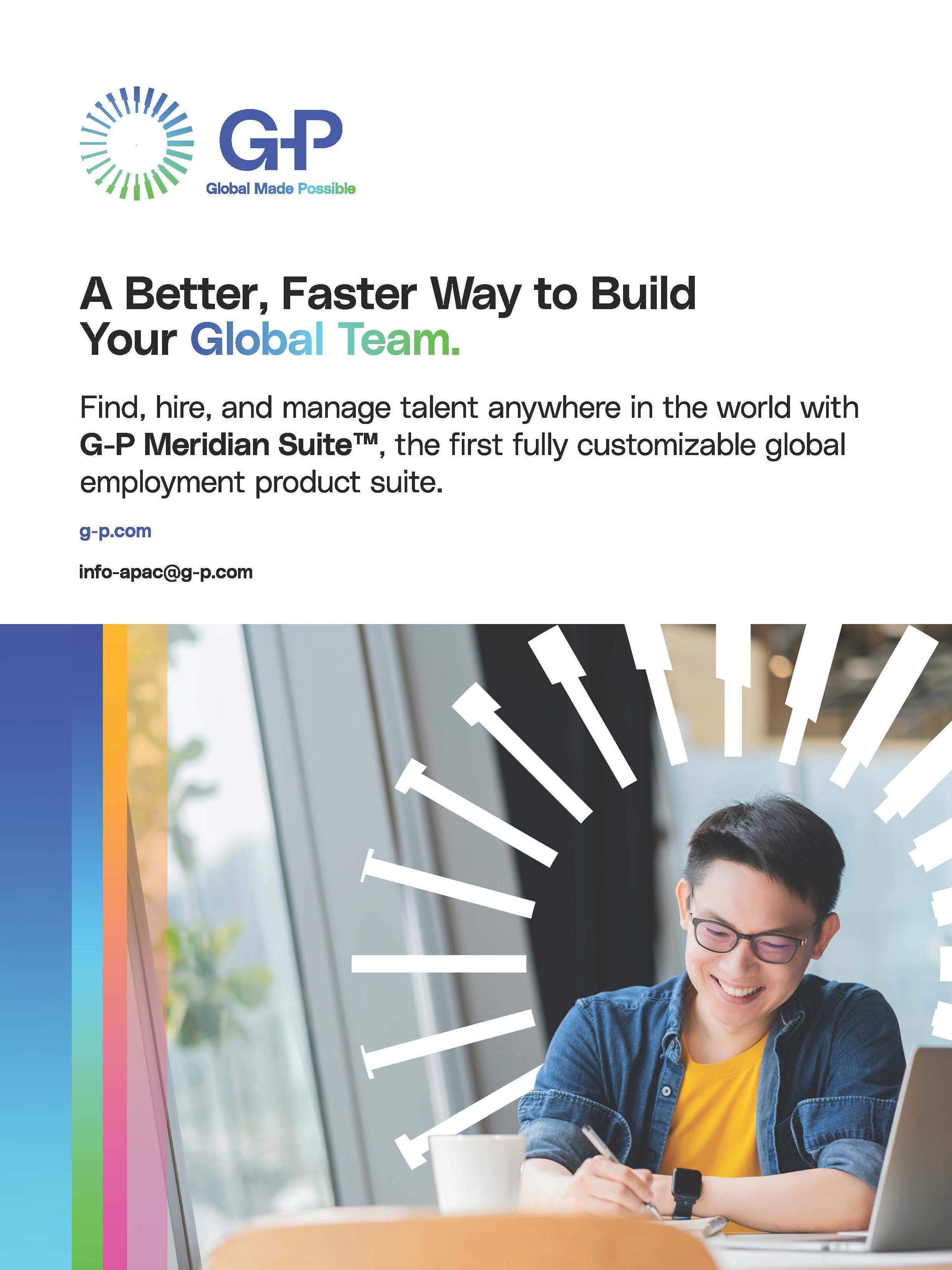





















 Managing Director
Managing Director












































































